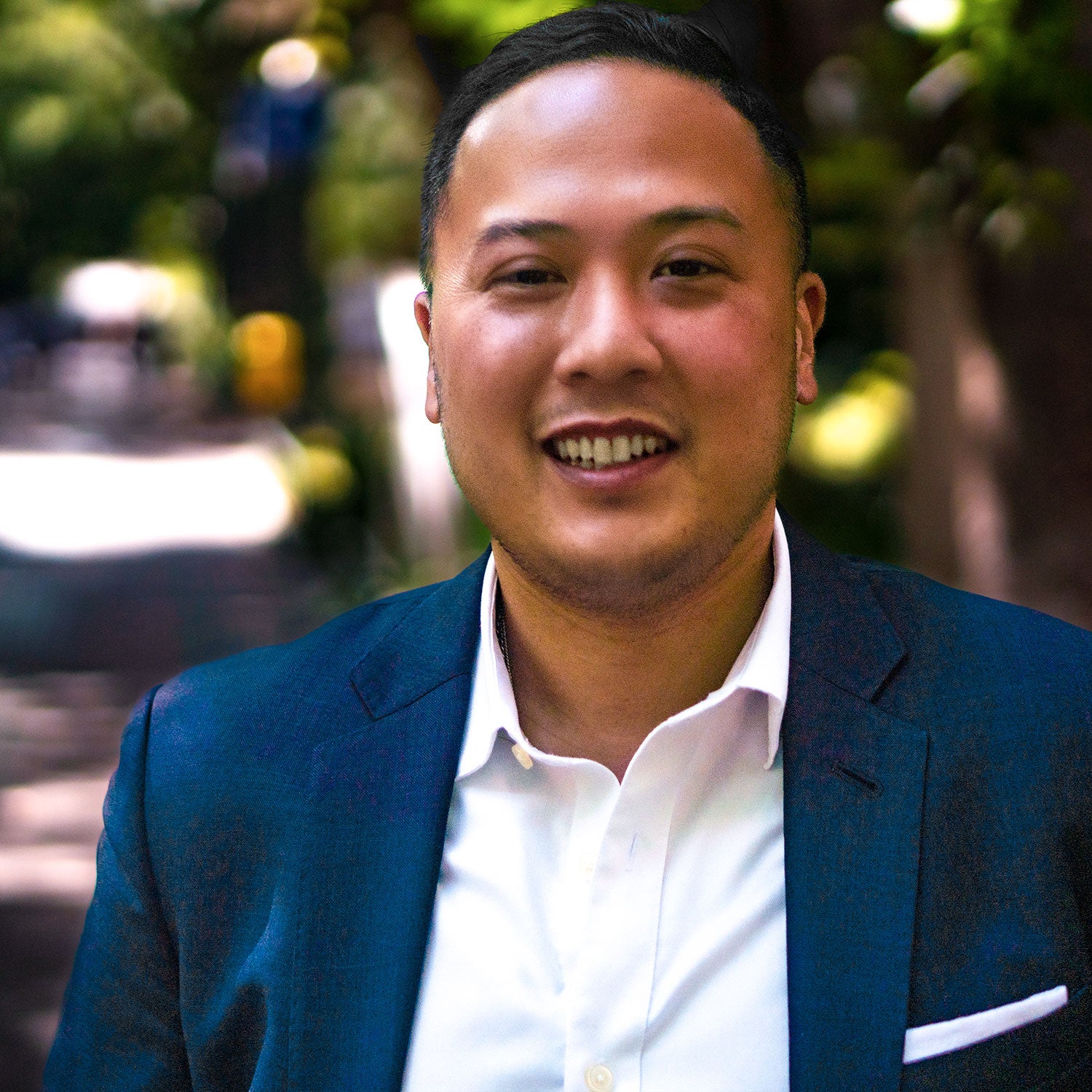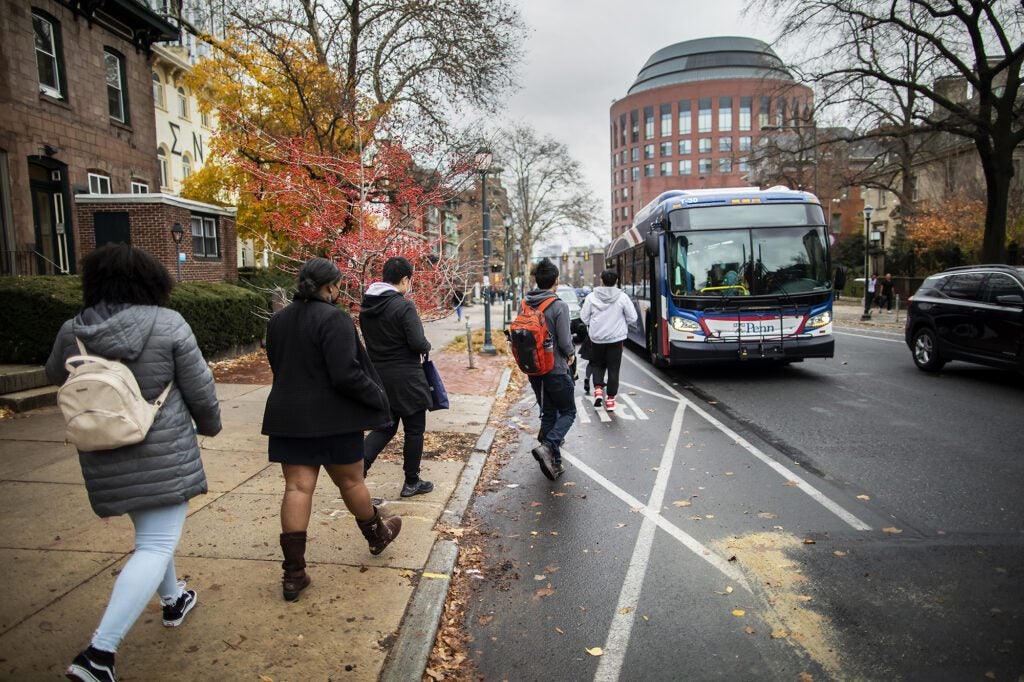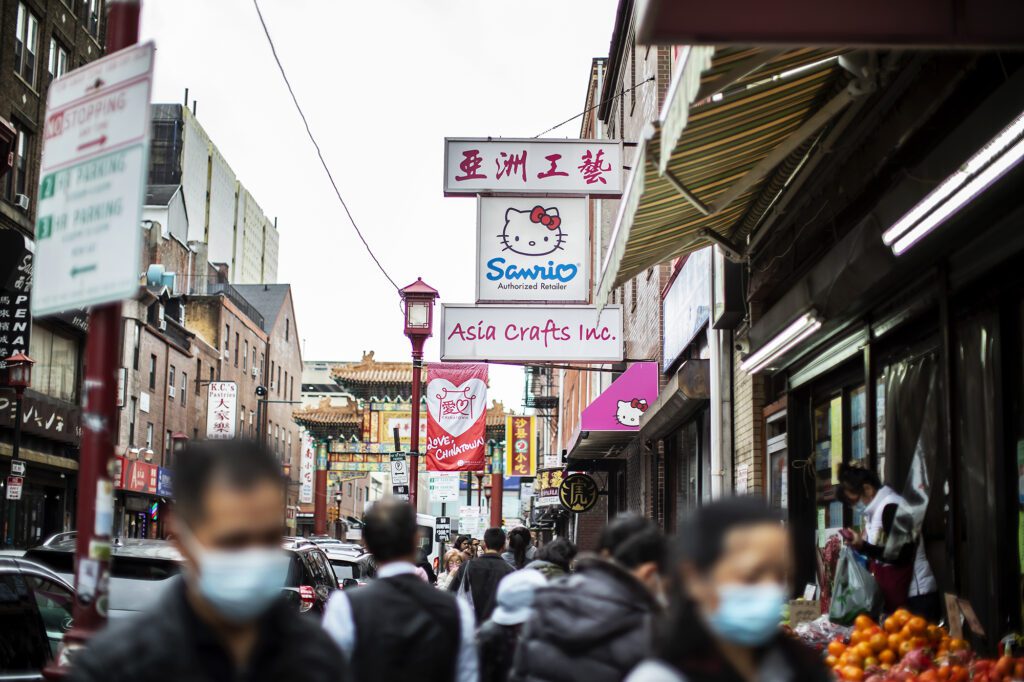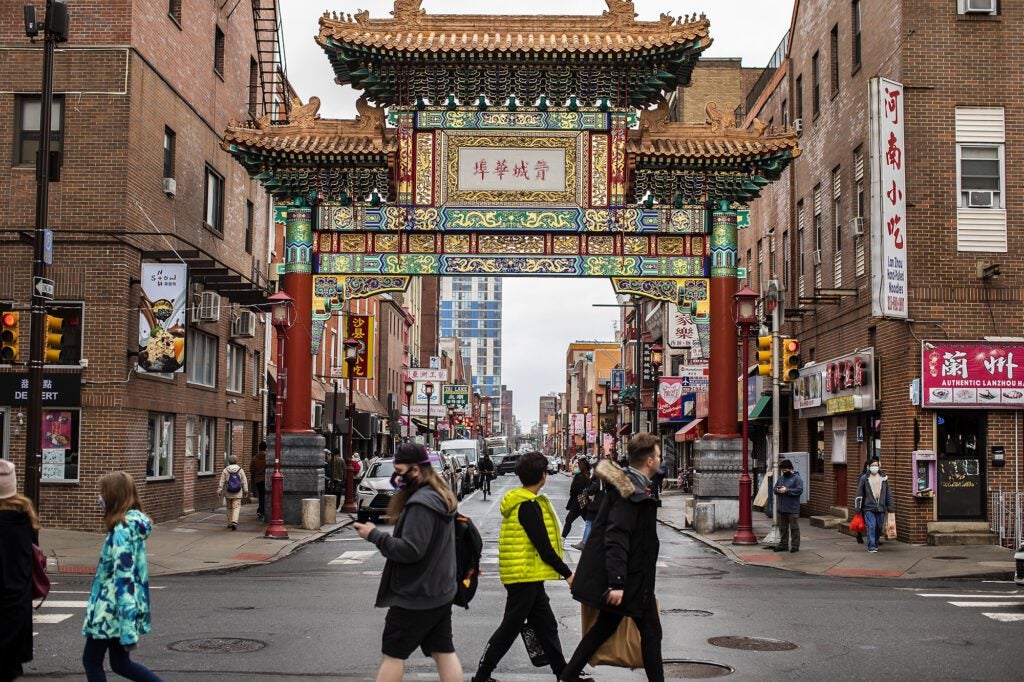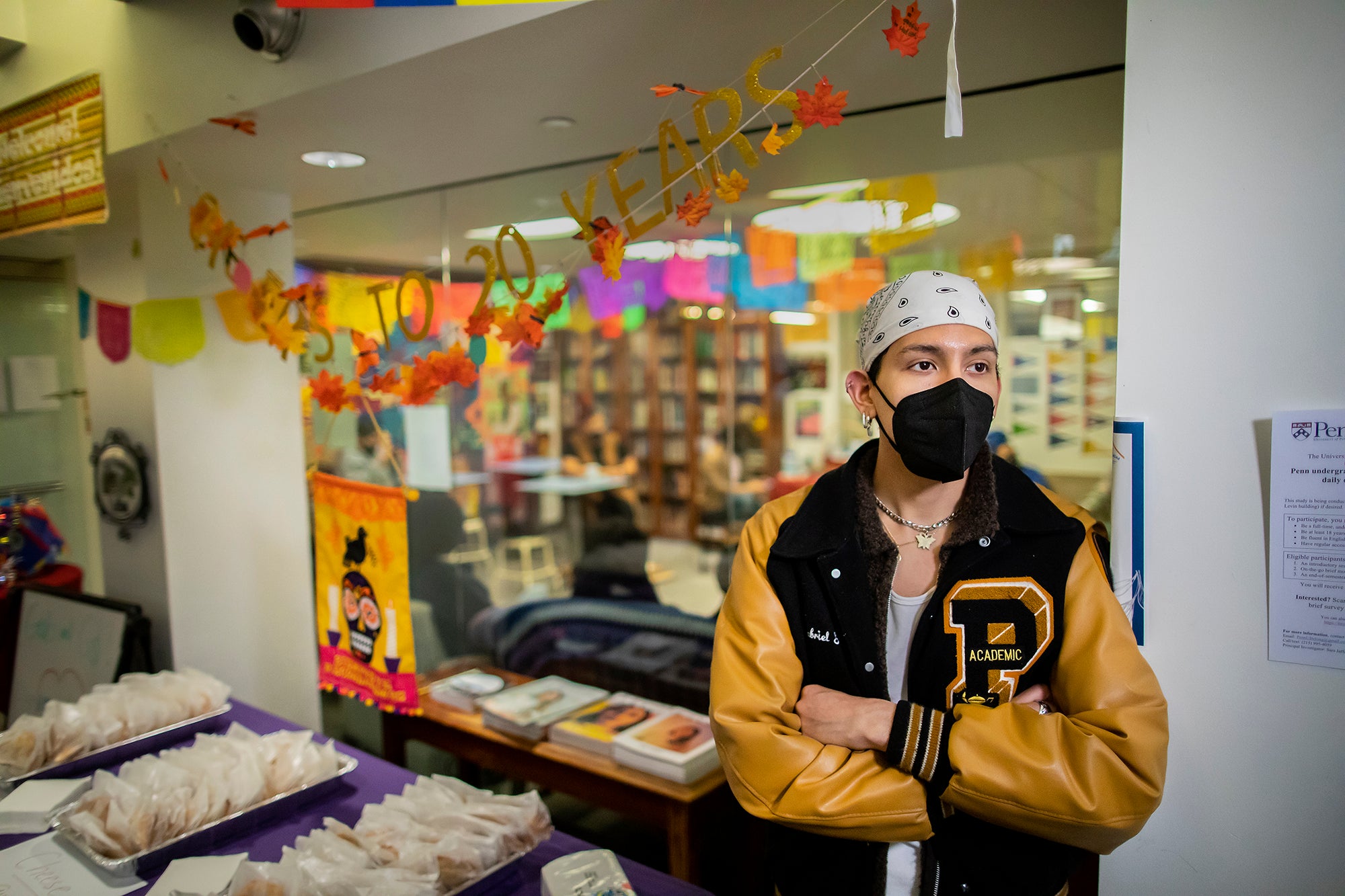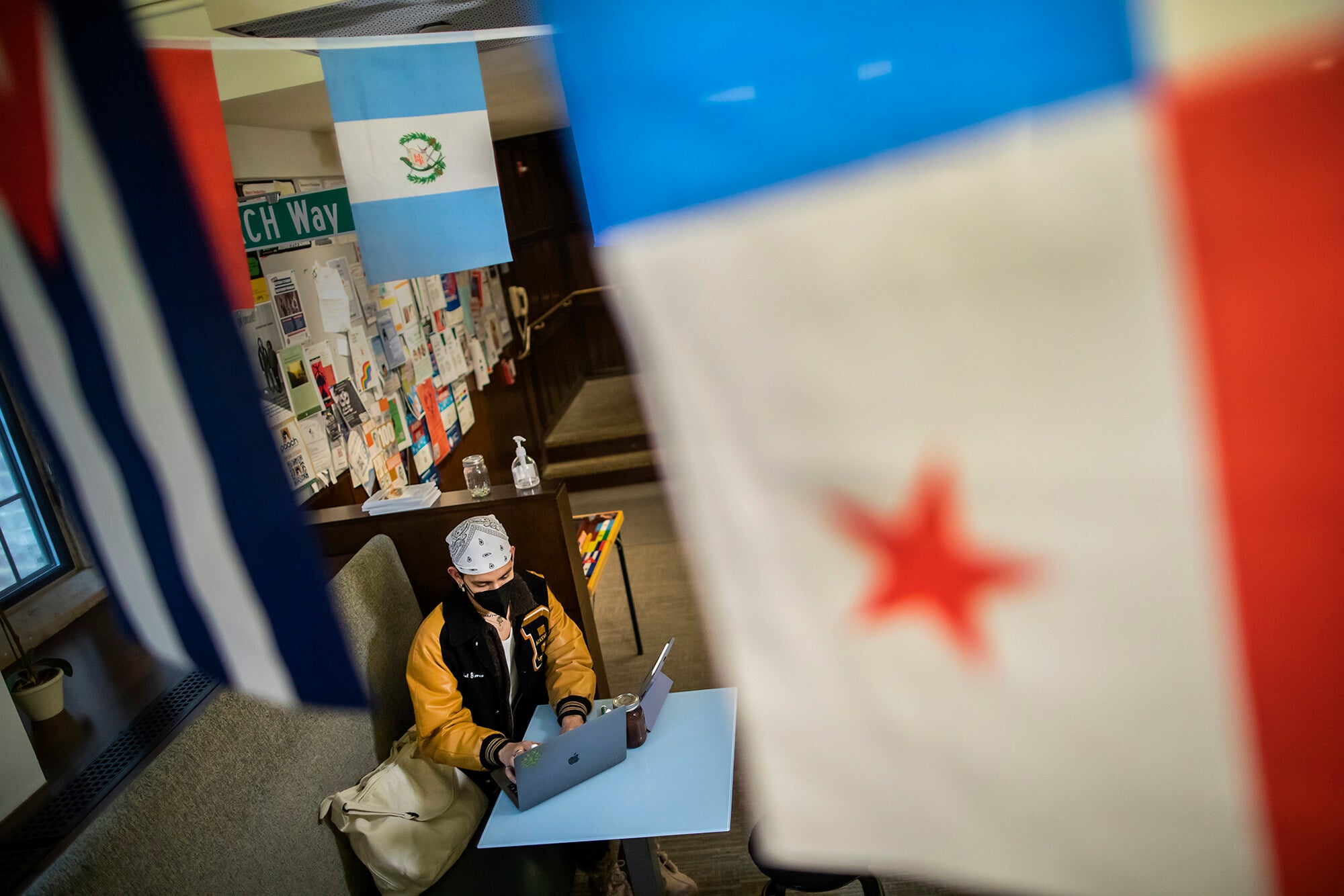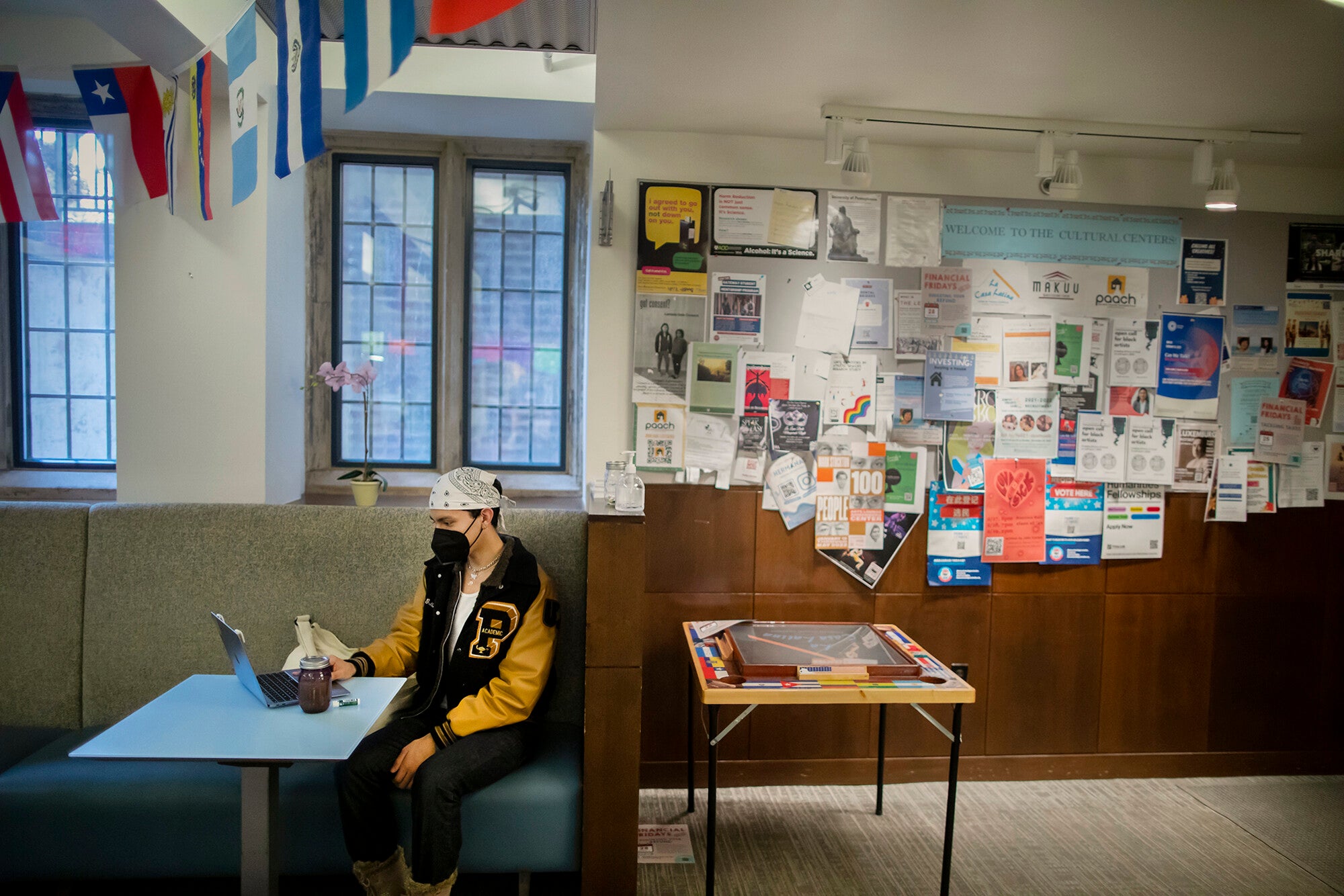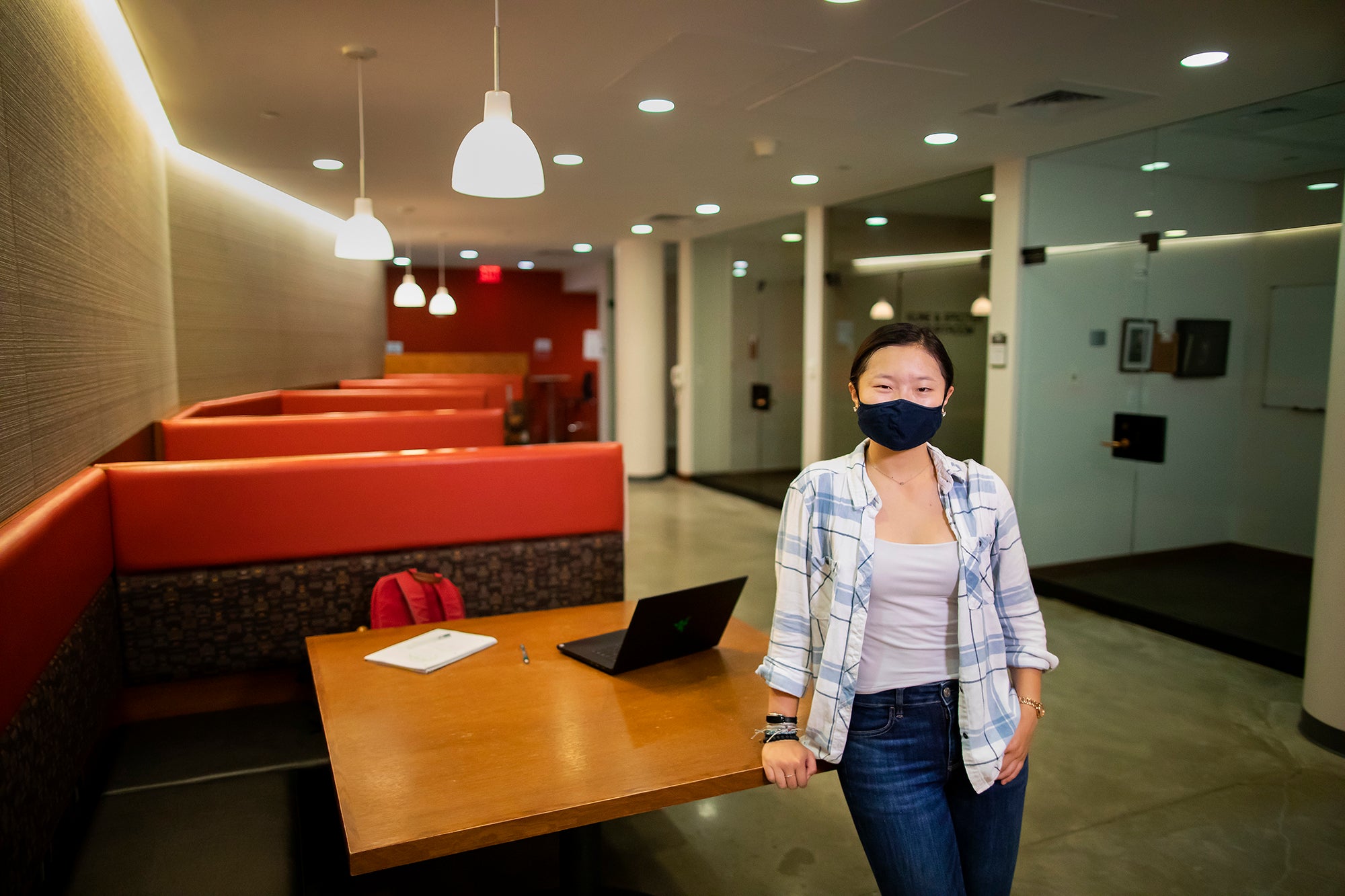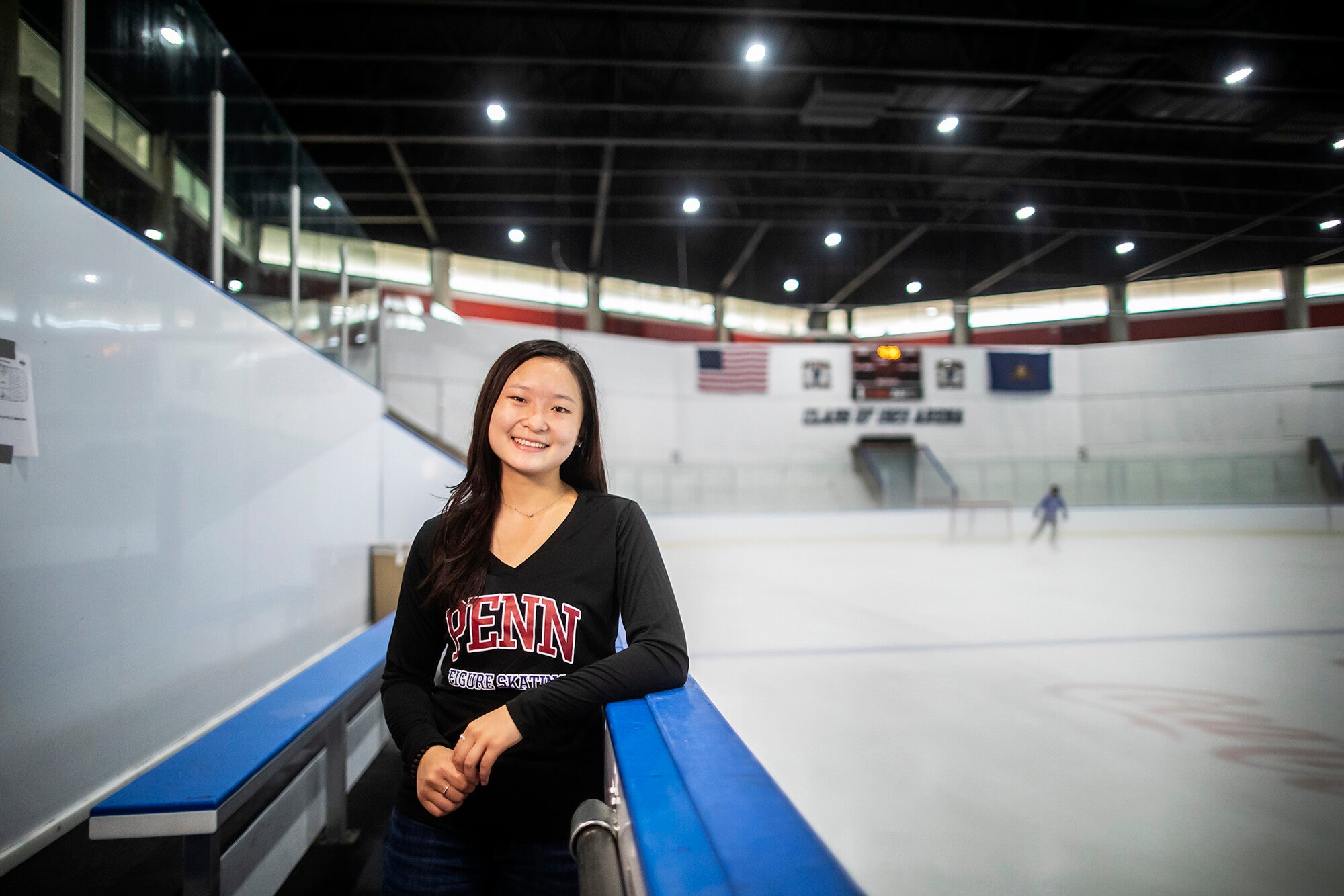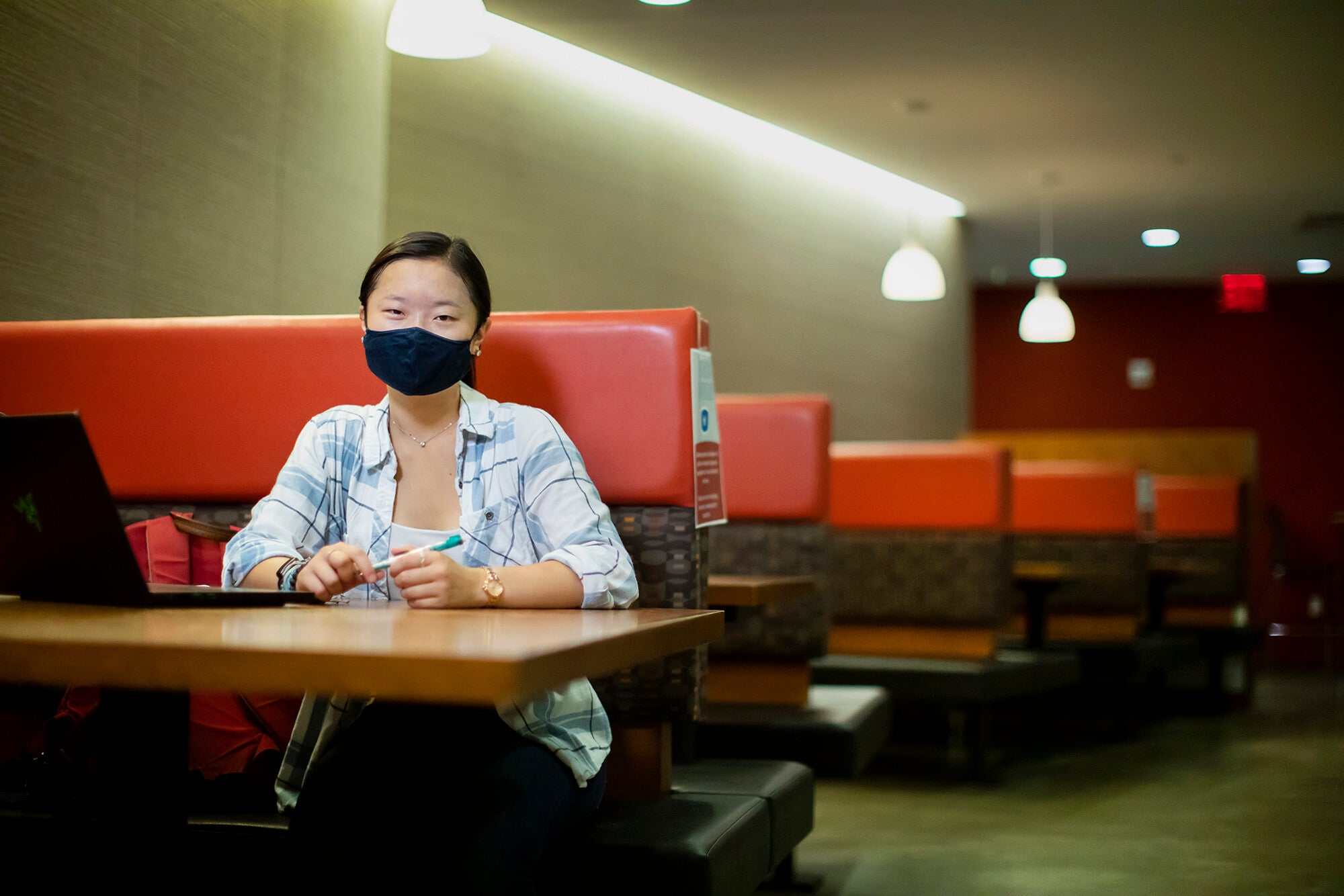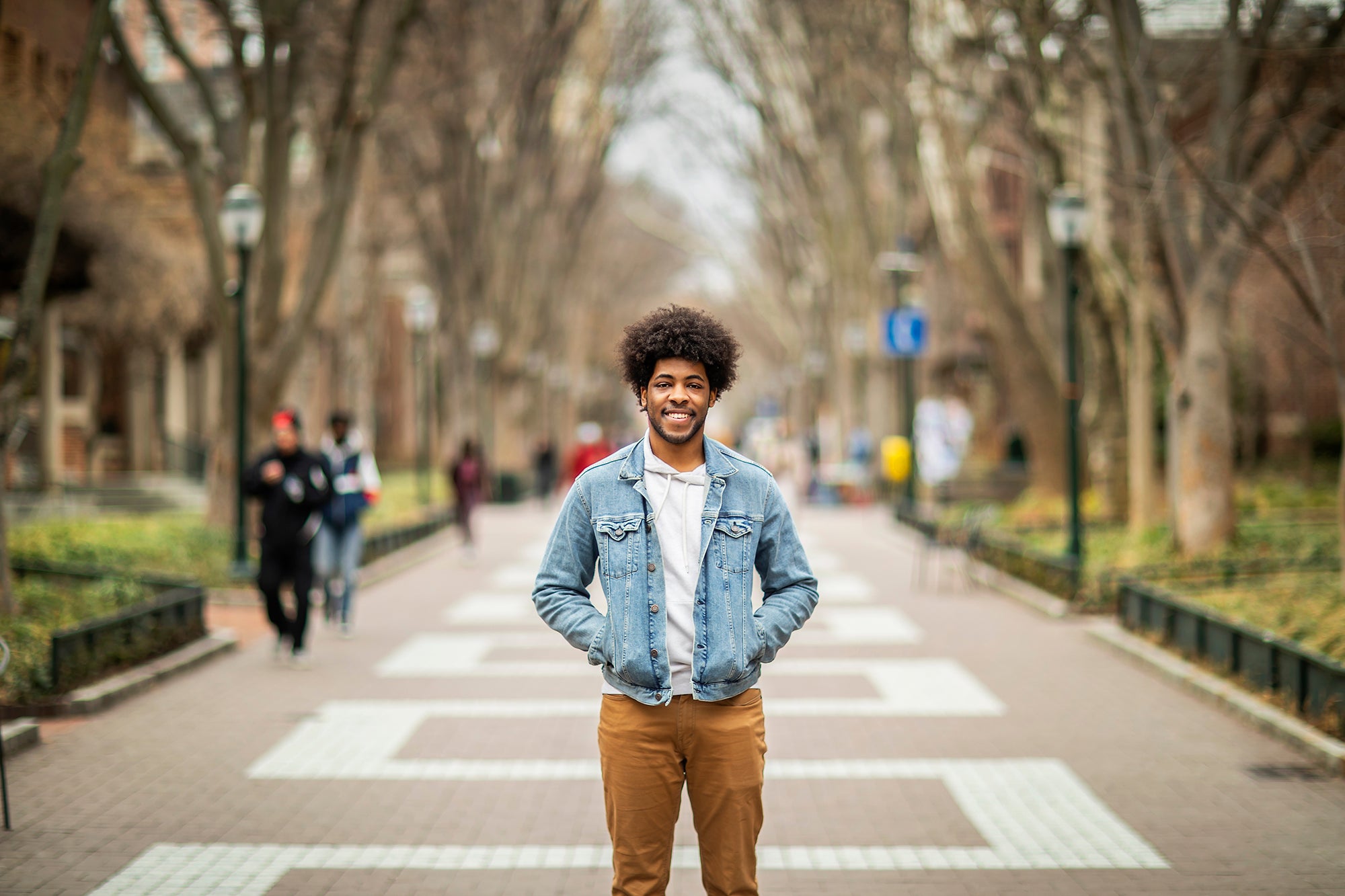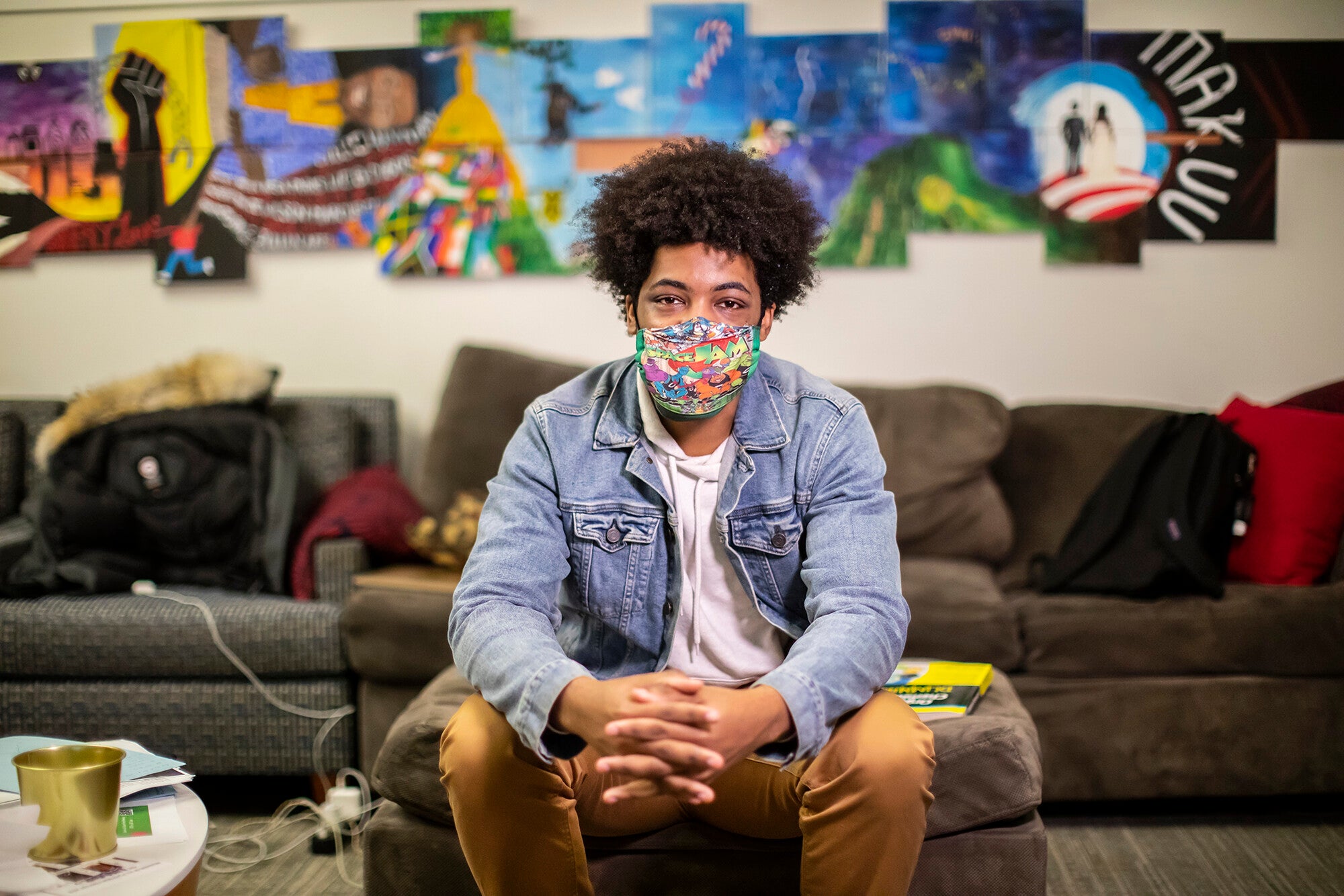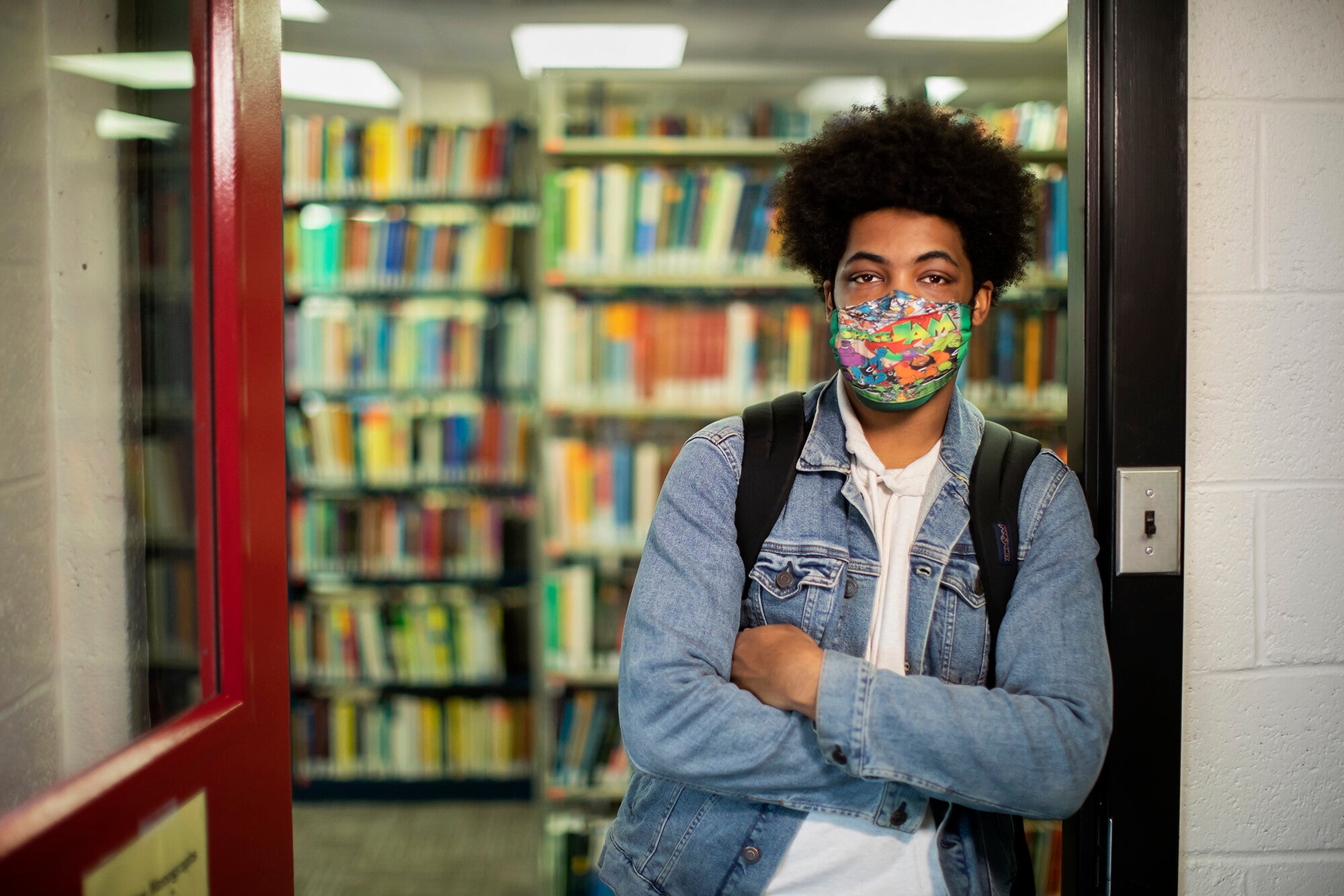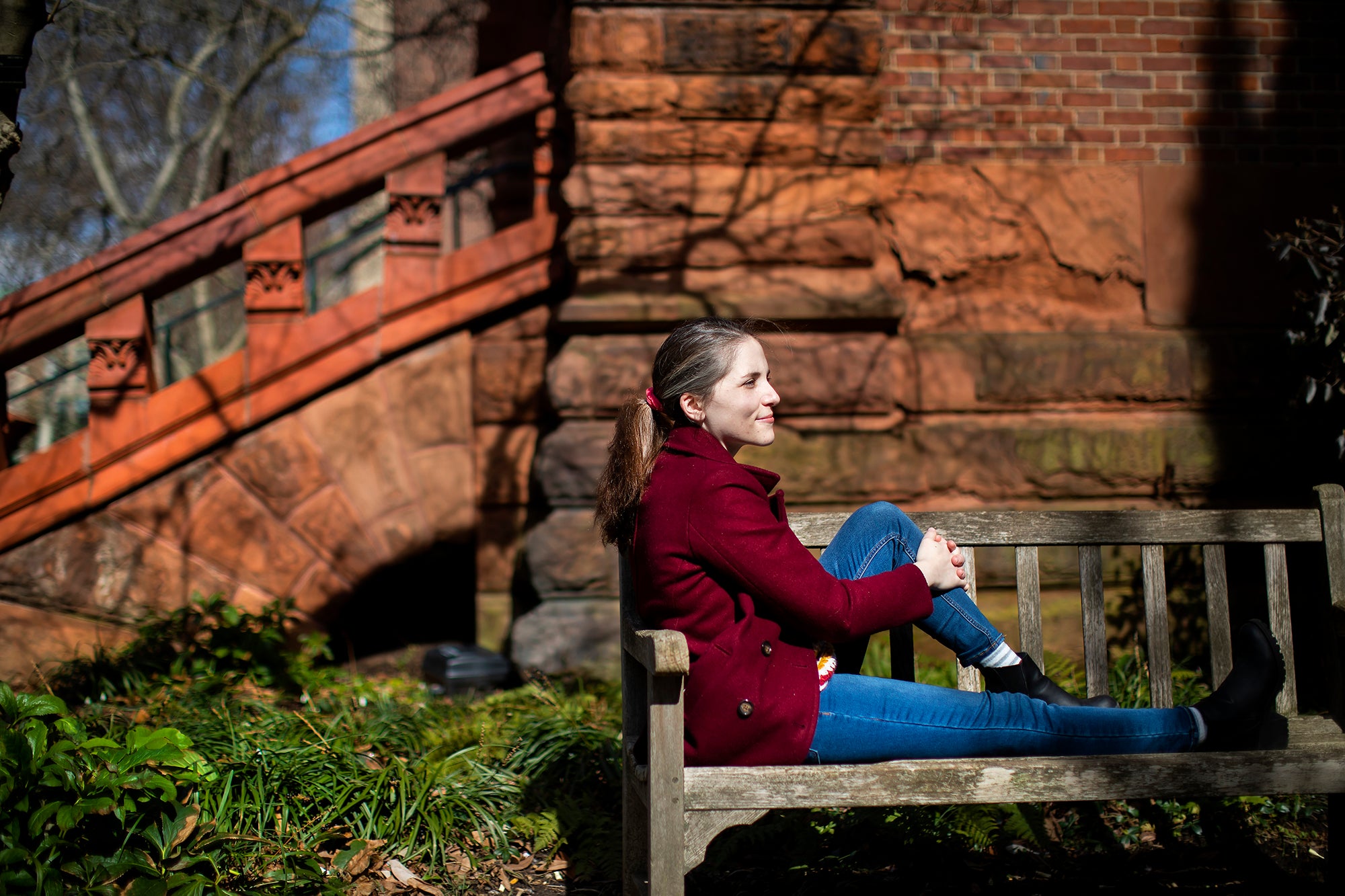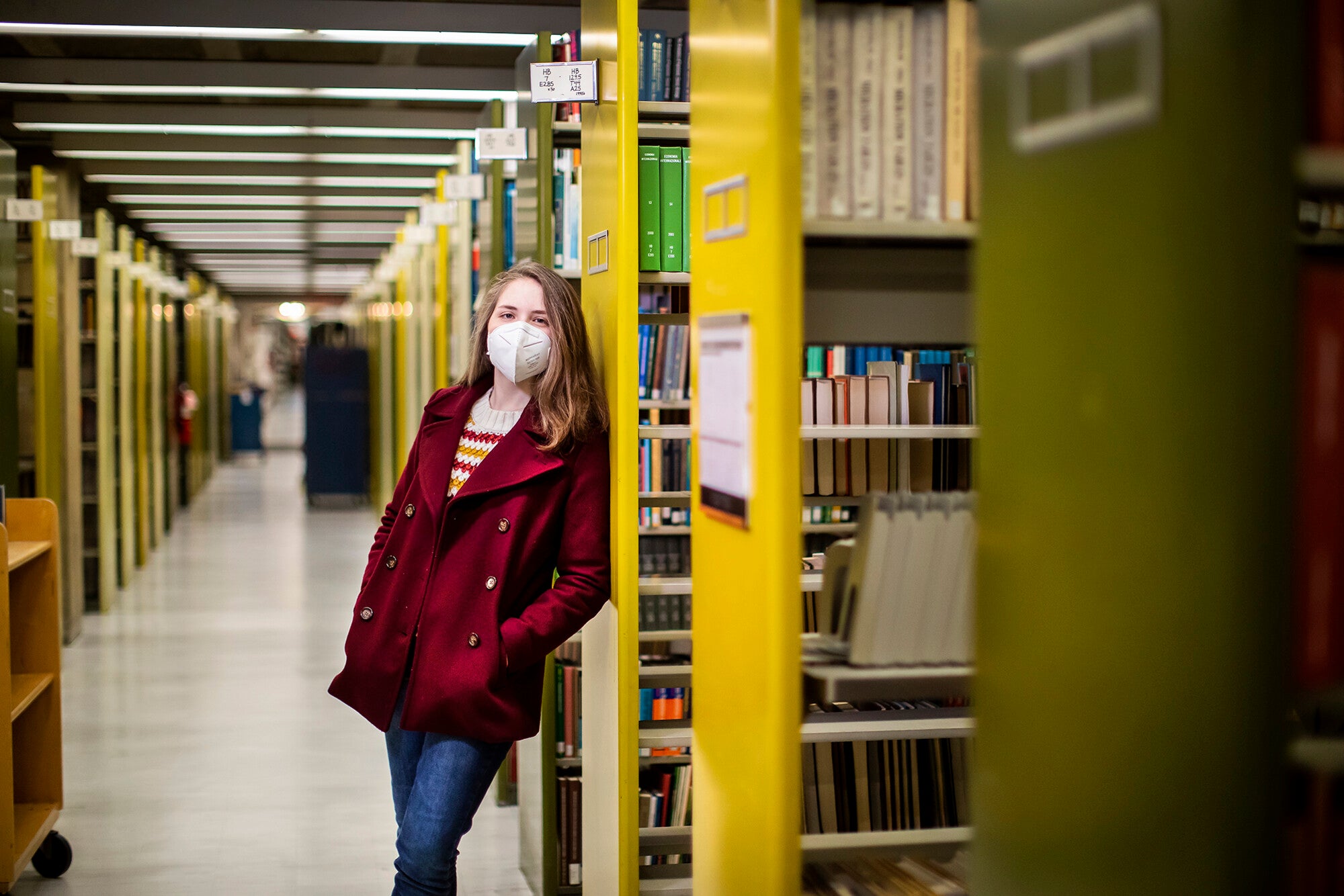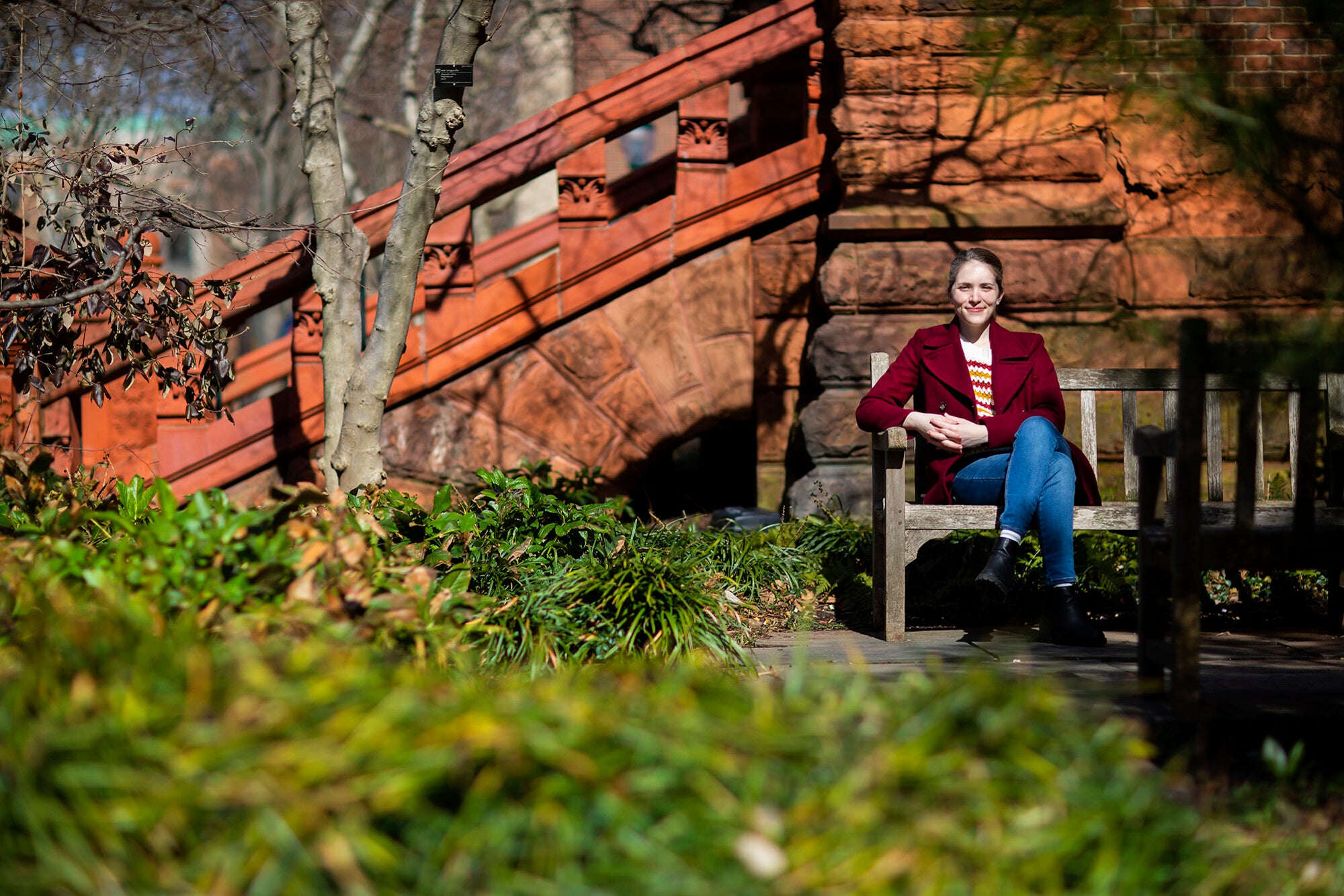Projection and Pursuit: A Two-Fold Meaning of Longing
University Life shares the wisdom of Sam Strickberger, ’22 Class Board President and speaker at this year’s Commencement Baccalaureate Ceremony. Sam’s speech, Projection and Pursuit: A Two-Fold Meaning of Longing, is an inspiring reflection on pursuing your passion.
Thank you, Sam.
Penn is honored to have your energy and spirit. Congratulations!
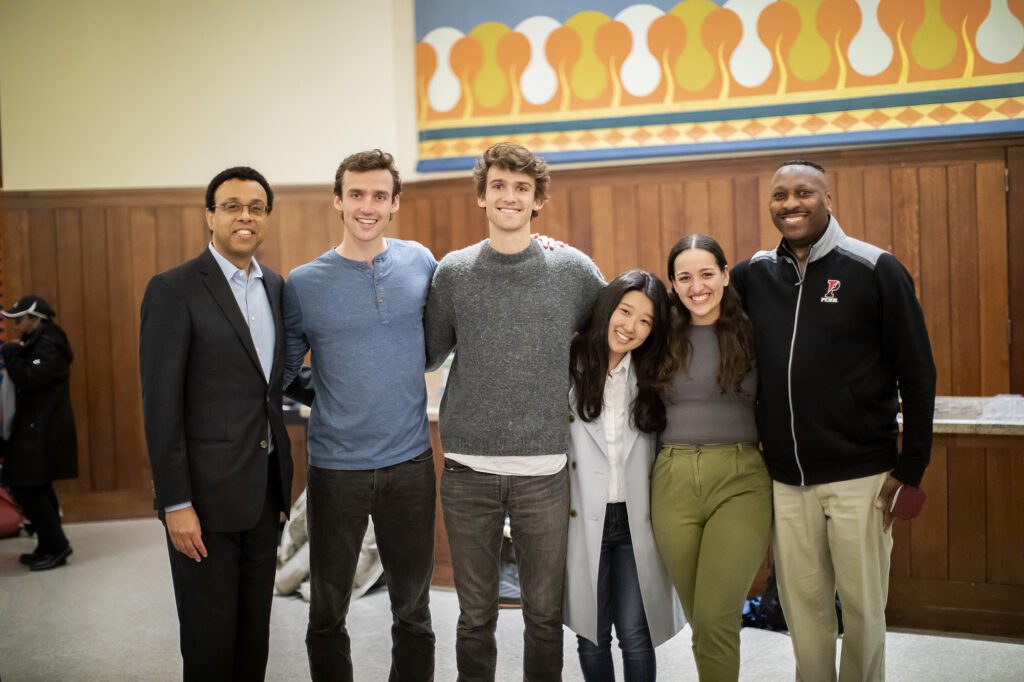
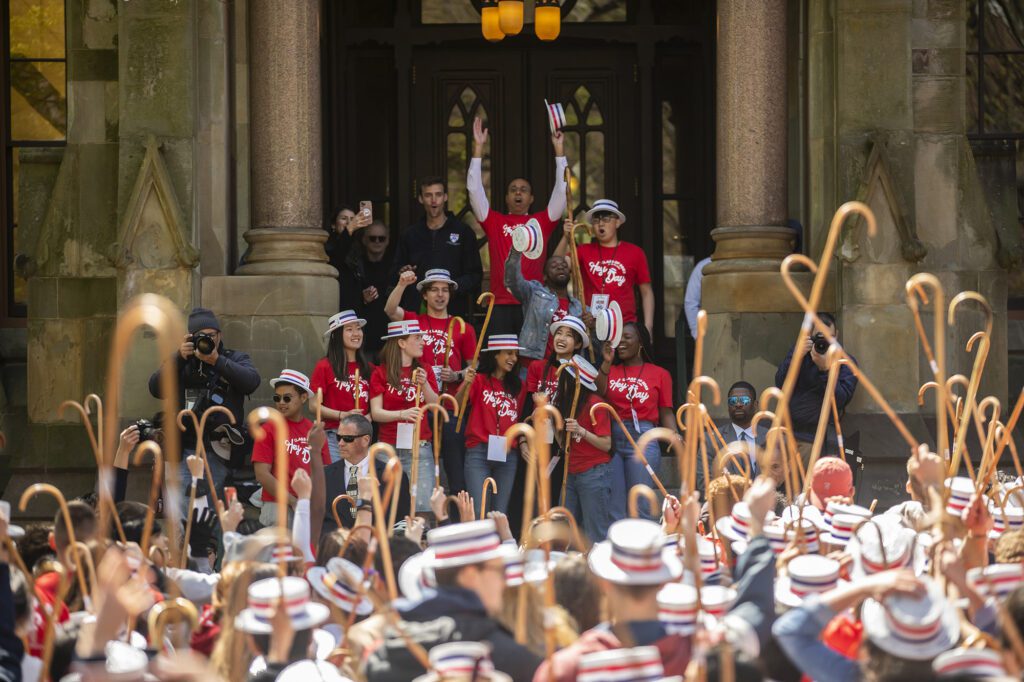
By: Sam Strickberger
Good afternoon, Class of 2022.
I can’t believe we are here. The last-minute assignments. The early morning practices. The late-night rehearsals. The rush of Locust. We’ve made it. In less than a week, we’ll walk out of Franklin Field as graduates of the University of Pennsylvania.
But, before thinking about the future, I want to rewind.
Do you remember during NSO when all the gap year kids were talking about how transformative their past year was. And you were like: nobody cares. Well, I was one of those gap year students. And, if you’ll indulge me, I’ll briefly talk about my gap year.
Prior to Penn, I spent a gap year in Jerusalem studying ancient Jewish texts – practical right – with a diverse group of Jewish Israelis and Americans. It was a pretty privileged time. I had limited responsibilities and was immersed in a place of inherent spiritual meaning. One concept from the year stood out: the idea of longing, seeking to find my home in the world, pursuing my “why.”
I started Penn with the nervous excitement that fills much of NSO. It was then that I first encountered the three classic, introductory questions: “What is your name?” “Where are you from?” And finally, the loaded one, “What do you want to do?” I had no idea what to say the first time I was asked it. I thought I had the next four years to figure it out…at the least.
We were a bunch of newly admitted students, who recently wrote in our college apps about being “intellectually curious” at Penn. I thought we came here to begin to figure out an answer to that question. And so, during NSO, when I did come up with my own answers to it, they seemed forced. The question incentivized a predetermined path, maybe even closed-minded projections for the future.
I learned from my experiences in Penn and Jerusalem that there are two conceptions of longing. There is Projection and Pursuit. To project is to think in the concrete, the linear, the practical, that what’s-been-proven. It’s the you-in-ten-years that you create today. It is a business plan. The business of living.
To pursue is to think in the abstract, the creative, the values-based, the finding-your-why. Hearing the whisper of your inner child. It is an artistic creation. The art of living.
Thinking of our NSO experiences. Projection is the question “what do you want to do?” Pursuit is the question “why do you want to do what you do?” Projection is the what. Pursuit is the why.
I want to give room for both. Not only because both are within me – and I imagine all of you. But because I deeply believe that both are crucial for success and flourishing. Projection without pursuit is an empty way to live; but pursuit without projection is unrealistic for achieving life’s goals, meaning, I imagine, we have to know how the world works, have the network, the skillset, the planning, to realize any big visions.
However, I think at places where we find ourselves surrounded by ambitious, brilliant people – places like Penn and likely where we are headed eventually – projection rules the day. So, today, I want to uplift pursuit.
In particular, pursuit is about the power and necessity of choice. “Man is condemned to be free,” writes Sartre, a twentieth-century existentialist. We are not free to choose, but we are free to choose, he argues. Did you get that? Neither did I. David Foster Wallace puts it more simply. “In the day-to-day trenches of adult life…There is no such thing as not worshipping. Everybody worships. The only choice we get is what to worship.”
And our apparent options aren’t all so great. Wallace continues, “if you worship money and things, then you will never have enough. Worship beauty, you will always feel ugly. Worship power, you will feel weak and afraid. Worship your intellect, you will end up feeling stupid.”
Worshiping something transcendent, on the other hand – things like justice, love, spirituality – helps guide us. Pursuit is discovering that deeper “why.” And projection has its place too: it helps us achieve our pursuits.
Here are a few examples.
As a first-year, Maeve Masterson told me that she wanted to pursue climate justice and while at Penn she wanted to find the skillsets that would enable her to do that best. Four years later, she is still pursuing climate justice and through her education she’s planned – or, to use our terminology, projected – how to get there: she gained experience as a leader of Fossil Free Penn and studied environmental science and decision sciences. And she’s walking away from Penn with a masters in social policy to continue her pursuit.
I think about other students who pursued justice while at Penn. I think about Mary Sadallah, a dear friend and first-generation college student, who – as Vice President of the UA – distributed nearly $1 million to largely benefit first-generation, low-income students and students of color. I think about Niko Simpkins, who leveraged his love of engineering to encourage, support, and create space for marginalized engineers by reinvigorating the Underrepresented Student Advisory Board in Engineering. The list goes on. So, I’ll give you one more example. I think of Sam Pancoe who created the PennGenEq preorientation program to foster an inclusive space for all gender identities on campus.
These successful endeavors of our classmates – and many like them – taught me important lesson. Prioritizing pursuit, and letting projection follow it, is powerful. It can help us to access meaning and even success, however we define it. On the other hand, when projection comes first, when we take the road most traveled without examining it for ourselves, we risk losing track of what we care about most.
Still, valuing our “why,” our “pursuit,” isn’t easy. It’s hard and not always possible. It was uncomfortable telling people you were “undecided” as an underclassman. It was anxiety-producing to still be figuring out where to apply for an internship when friends had already landed their “dream job.” There is discomfort and anxiety in pursuit.
What’s the antidote? I honestly don’t know. But, I’ve drawn some insights from the actions of my twin brother, Max, and my roommate, Alan Jinich, as they took off from school last spring – when I sat through my zoom classes – to crisscross the United States and create an oral history of our generation’s covid experiences. Their decision taught me what Penn positive psychologist Karen Reivich confirms through her research. That perhaps pursuit requires three things. It requires gratitude for what we have, curiosity for what can be, and, along the way, favorable judgment for others. Pursuit also requires patience. Patience to wait, to reflect, to do things differently.
So, with the power of our education – our acquired knowledge, skills, community, and yes, that expensive piece of paper called our diploma – we are uniquely positioned for pursuit.
So, I challenge our great class to not get stuck in projection, in worshipping the rat race, the highest paying job, the most prestigious next step. I encourage pursuing our “why” and hopefully connecting it to something bigger than ourselves, something holy, something like justice. As Benjamin Franklin writes at the bottom of every PennToday email: “The noblest question in the world is: what good may I do in it?”
Given the nature of the Baccalaureate ceremony, I want to close with a blessing of pursuit, a blessing which randomly hangs from a corkboard in my childhood home and fittingly was delivered at another college graduation ceremony but in 1985:
“May [we be blessed] with discontent with easy answers, half-truths, and superficial relationships, so that [we] will live from deep within [our] heart[s].
May [we be blessed] with anger at injustice, oppression, abuse, and exploitation of people, so that [we] will work for justice, equality, and peace.
May [we be blessed] with tears to shed for those who suffer from pain, rejection, starvation and war, so that [we] will reach out [our] hand[s] to comfort them and to change their pain to joy.
[And] may [we be blessed] with the foolishness to think [we] can make a difference in this world, so that [we] will do the things which others tell [us] cannot be done.”
Thank you so much for listening. A huge congratulations on graduation. We’ve finally made it.
Leadership from the Lens of a Former Lawyer
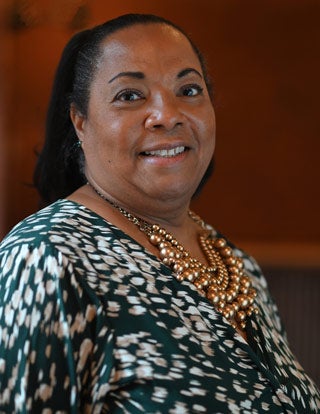
Forty years ago, Tamara Greenfield King, J.D. would have never imagined herself working in higher education, let alone in a senior leadership role on a college campus.
King was a lawyer by trade. A graduate of New York University School of Law, she served as an attorney for more than a decade before transitioning to higher education. After 20 years in student affairs, King arrived at the University of Pennsylvania as the Associate Vice Provost for Student Affairs in 2019.
In her current role as Senior Associate Vice Provost for University Life at Penn, she supervises Career Services, Naval ROTC, the Office of Fraternity and Sorority Life, Office of Student Affairs, and Platt Student Performing Arts House. During the 2021-2022 academic year, King interimly oversaw the six cultural resource centers on campus: Penn Women’s Center, LGBT Center, Center for Hispanic Excellence: La Casa Latina, Makuu: The Black Cultural Center, Pan-Asian American Community House, and the Greenfield Intercultural Center.
Her legal background aligns fittingly with the University Life Senior Leadership team’s vision of collective wisdom. Using different lived experiences and representation — in Tamara’s case, as a Black woman with extensive courtroom skills — helps the Leadership Team make informed decisions for students to engage, thrive and succeed.
I try to mentor students — more particularly women — to always have a broad base of skills and experiences within your network. So, when an opportunity presents itself, whether you’ve ever considered it or not, you can give it its proper vetting.
A native of Easton, Pa., King attended Penn State University as a first-generation, low-income student. She received her bachelor’s degree in political science with minors in sociology and Black diaspora studies.
As a student in the 1980s, Tamara protested Penn State’s endowment investments in the diamond industry in apartheid-era South Africa. She fought against racism Black students faced in State College, including racist encounters such as appropriation through Halloween masks and costumes. King extrapolates her experience as a young student activist in the early 1980s to her present involvement in higher education.
“When working with students, I understand their passion around a particular topic,” King said. “When students engage in activism, I want them to have well-thought-out ideas, well-planned events, and well-executed advocacy. Because whether we recognize it or not, students can shape the climate and the way the administration responds to a multitude of issues.”
King received her Juris Doctorate degree at NYU School of Law, practicing for 12 years in Cincinnati and the Lehigh Valley. During that time, King also became the first African American Assistant District Attorney in Northampton County, Pennsylvania.
Marriage took King to St. Louis, setting the stage for a career transition. Rather than resetting herself professionally with a new law firm in Missouri, Tamara found a more family-friendly career field in higher education. Admittedly overqualified, she took a position as the Director of Student Conduct and Community Standards at Washington University in St. Louis.
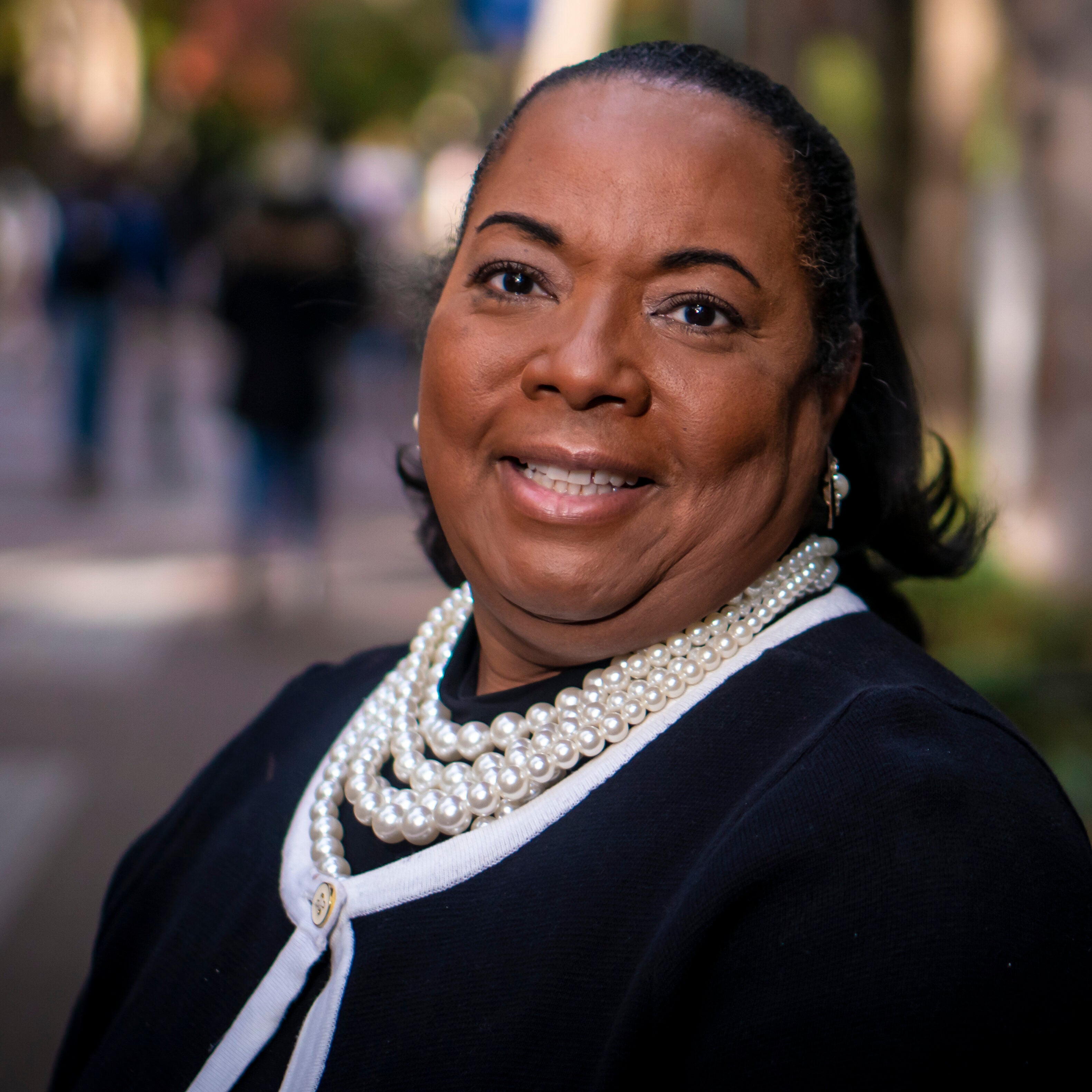

Over 20 years, King’s role at Washington University in St. Louis expanded to become Associate Vice Chancellor for Student Support and Wellness. She oversaw the university’s student health system, sexual violence and prevention office, and behavioral intervention crisis management team. King directed services geared for first-generation and low-income students by addressing basic needs insecurity.
King said her background allows her to look at situations through different lenses. She looks at them from a lawyer’s perspective with a focus on meeting compliance, managing risk, and following procedure. She can see them from a student affairs viewpoint, as she has now been in an academic setting longer than she has a courtroom. Tamara also views issues as a former Pell recipient that attended college long before additional resources were available for low-income students.
During her time at Washington University in St. Louis, she became one of higher education’s most prominent voices in student conduct and Title IX. King served as the first Black president in the Association for Student Conduct Administration.
In late March, King joined the rest of the University Life Leadership Team at the Women of Color in Higher Education Summit, hosted by Penn’s Graduate School of Education, Center for Professional Learning, and Office of Student Services. During her remarks, she stated it is imperative for women of color to research and write within their own areas of expertise, noting that higher education needs to have diverse perspectives as part of the teaching and learning of graduate and professional students heading into the profession.
King stressed the importance of developing social networks, mentorships, and supports — “sister circles” — for female students of color. “We have to teach the importance of networking and mentoring,” she added. “To the extent that you’re able to help people make things happen, then you should mentor folks. You should also be surrounded by mentors who don’t all look like you, who all aren’t the same gender, and who are different, but still can serve as a positive mentor for you.”

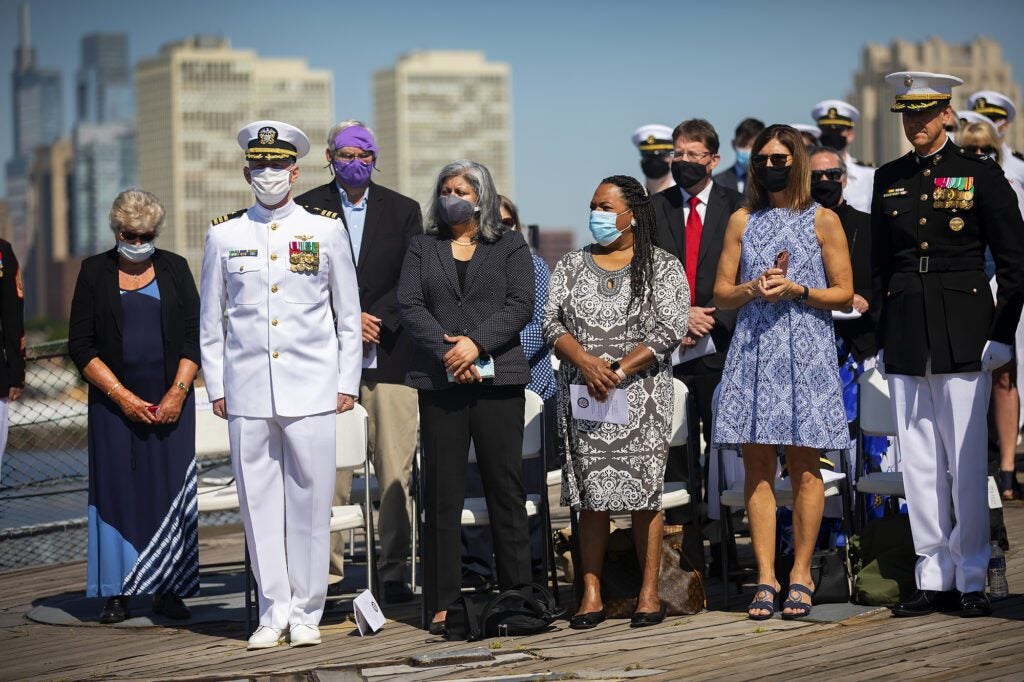
Tamara said she is proud to be a part of the “most likely the most diverse leadership team in the Ivys.” Uniquely comprised of all female-identified women that are Persons of Color, the University Life’s leadership team comes together to have frank and open conversations about what can be seen as Penn’s strengths. Diverse representation also allows them to see systematic flaws within the approach to student affairs and gives everyone at the student table an equitable voice.
“When a new student arrives on campus and sees people of color, specifically women of color in significant leadership roles, it demonstrates an institutional level of appreciation of diversity, equity, inclusion, and belonging,” King said. “We’re proud to say, we are able to walk the talk, because we come with that perspective.”
The Leadership Series will continue throughout May with feature stories on Sharon Smith, Associate Vice Provost for University Life, and her reconstruction of departments around the concept of community care to support students in crisis; Laurie A. Hall, Assistant Vice Provost for Strategic Planning and Operations, and her reimagination of how Penn uses space through a social justice lens; and the division’s success at NASPA as an embodiment of collective wisdom.
Triple S Show Student Spotlight
Hi everyone! My name is Isha Reddy, and I’m a freshman at Wharton, and a Strategic Planning and Communications intern here at Penn University Life. Working for University Life, I get the unique opportunity to highlight some of the amazing cultural and student life events at Penn, as well as feature the exceptional students behind them through our Student Spotlight series.
A couple of weeks ago, I was given the opportunity to interview sophomore Harley Haas and learn about her experience working with the Abuse and Sexual Assault Prevention Club to organize the first in-person Take Back the Night event at Penn since 2019.
Today’s spotlight features Zaria Franklin, a senior in the College who has been actively involved with Greek Life at Penn. Zaria has been part of the Alpha Kappa Alpha sorority since 2019, surrounded by like-minded women with a purpose to serve their communities and build lifelong bonds along the way. Apart from this, Zaria is also the Chairperson of the Step, Stroll, and Salute show, also known as the Triple S Show, which is a competition between several chapters in the Intercultural Greek Council. The Triple S Show aims to highlight the history and significance of stepping, strolling, and saluting in these organizations, which take root from African American Greek life, allowing students of color to share part of their culture with the Penn community.
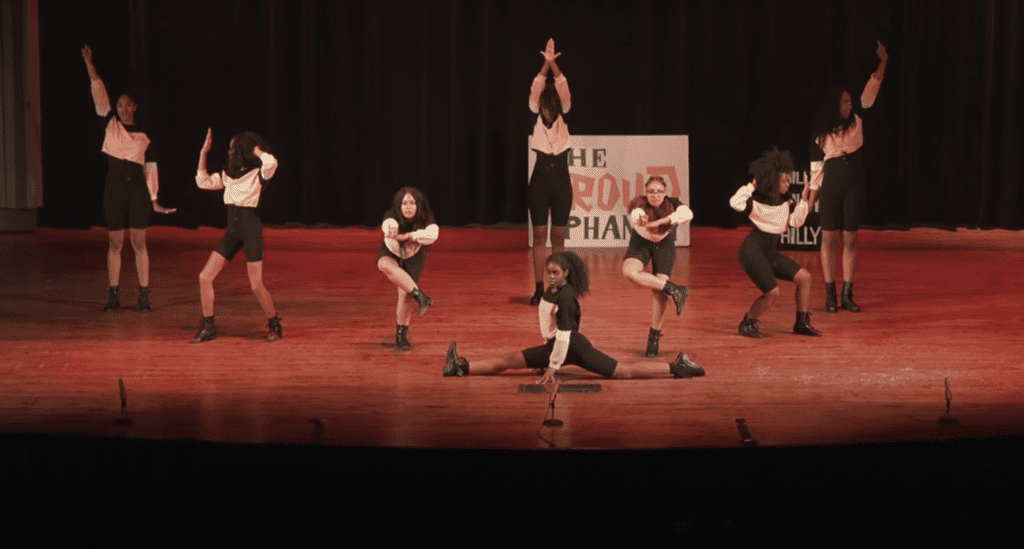
Given the major incidents of racial discrimination that this country has faced in the recent past, Penn’s multicultural Greek community continues to act as a strong support system for its minority students. The show aims to address the stereotypes surrounding these organizations and educate the wider Penn community on the impact they make on those around them. As the chairperson, Zaria liaises with Janae Tucker, the Intercultural Greek Council (IGC) and Triple S Show Advisor, as well as with her co-chair Jason McCleod to make sure the show runs smoothly. Behind the scenes, she ensures that all teams are well prepared for the show, that enough staff is available on the day, that the event is well marketed, and much more.
It was certainly challenging for Zaria and her team to organize the event after 2 years of facing COVID restrictions and logistical issues, but she is extremely excited to finally bring it back to Penn. New and improved, this year’s show features stepping, strolling, and saluting, unlike previous years’ which only included stepping. Further, the unique theme for this show is sure to make it an exciting and nostalgic one. Each competing team was asked to pick one of their favorite childhood movies as the theme for their act and incorporate it into their performance. If that doesn’t get you excited for the show, I don’t know what will!
This year’s Triple S Show is set to take place on Saturday April 30th, at 7 PM in the Irvine Auditorium. With over 10 teams performing, you can lend your support by purchasing tickets and cheering them on in person. But you don’t have to stop there, make sure to attend their ‘The Block Gives Back’ donation drive and cookout the day before, as well as the free after-party following the show for some delicious food, great music, and a good time.
Until next time,
Isha Reddy
Triple S Show Questions
How long have you been involved with Greek life and why did you choose to join a sorority?
I have been a member of Alpha Kappa Alpha Sorority, Incorporated since Fall 2019. I joined to be a part of an organization whose purpose is to serve their communities and build bonds with like-minded women.
What exactly is the Triple S Show?
The Step, Stroll, and Salute show is a competition between chapters in the Intercultural Greek Council. It is important to our chapters given the history and significance of stepping, strolling, and saluting in our organizations.
Why is it important to the Penn and Greek life community?
Given that we attend a predominantly white institution, it is not often that we get a chance to show parts of our culture on a big stage in front of the Penn community, Greek life community, and the greater Philadelphia community as well. We are excited to share something that is important to us.
What does your role as Chairperson of the Triple S Show entail?
As Chairperson, I do a lot of behind-the-scenes work along with Janae Tucker (Office of Fraternity & Sorority Life, Associate Director of Diversity & Co-Curricular Education) and my co-chair Jason McCleod to make sure the show runs smoothly. We make sure that all competing and exhibition teams are prepared for the show, that the show is properly advertised and marketed, that we have external staff in place for the day of the show, that all teams have a fair chance at winning, etc.
Do you work with a team/other Penn organizations/sponsors to organize this?
Yes! Janae, Jason Mcleod, Luz, and Jenny have all been a big help with this process. I am very appreciative of them.
What challenges did you face when organizing this event?
One of the biggest challenges was the change from just having a step show to a step, stroll, and salute show. In addition to emerging from COVID, there were a lot of things that we had to figure out logistically.
What are you most excited about during this year’s show?
I am most excited about seeing each team’s theme come to life. This year, each competing team was tasked with picking a movie that we watched as kids as the theme for their show. I can’t wait to see the incorporation of these movies.
How can students get involved in the event?
Students can get involved by buying tickets for the event! There is also a can drive taking place and we are donating to a community organization, The Block Gives Back. Students can attend our cookout the day before the show (all proceeds are going to the Block Gives Back). There is also an after-party after the show (free of charge) and food will be served!
Houston Hall to be revamped into ‘hub for students’ by Vice Provost for University Life
Houston Hall, the oldest student union in the nation, will undergo a renovations process to become a central hub of student life on campus, according to Penn’s Division of the Vice Provost for University Life.
Students have expressed for years that Houston Hall felt like “more of a dining area and study space than a hub of student activity.” This project, while still in early stages, hopes to address that sentiment, according to project leads Saleem Curry and Laurie Hall from University Life, who said they shared that the primary aim is to transform Houston Hall into a more inclusive, welcoming, and inviting space for students by restoring its status as a focal point of student life on Penn’s campus.
Before 2017, Houston Hall operated on a conference center model and was self-funded, according to Hall, the assistant vice provost for strategic planning and operations. She added that Interim President Wendell Pritchett has worked to dismantle that model to create a student hub during his tenure as provost.
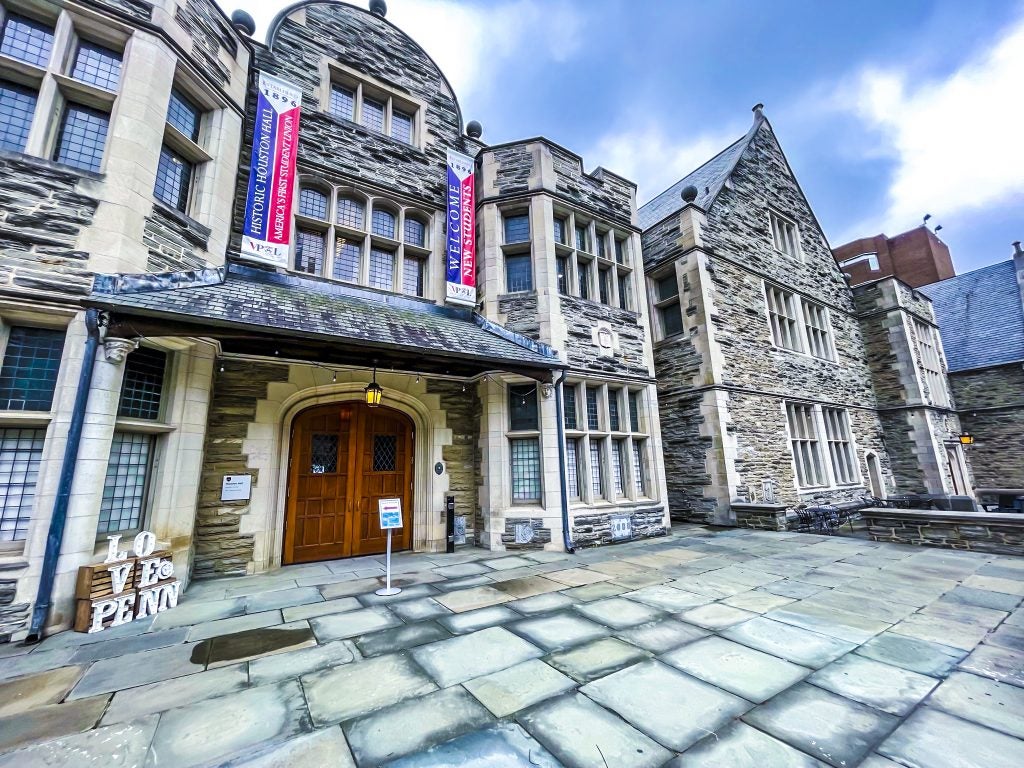
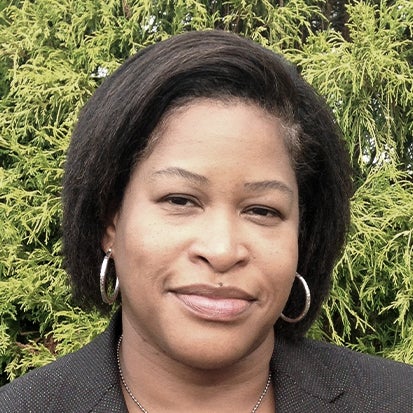
Curry, director of University Life Space and Events Management, said that although this project is rather abstract, he and Hall hope to involve students in the process as much as possible. He added that Pritchett’s idea to transform Houston Hall into a student-focused center came from students in the first place.
“What we [are] looking to do very shortly is to have a University Life space steering committee that is made up of students,” Hall said. She added that this committee would serve as a connection between all the different needs of the students.
Curry said that he hopes Houston Hall can “situate itself as a centralizing point” on campus and be a center for all types of campus involvement. In the future, Curry said he hopes that Houston Hall can host events on the weekends for students.
Students expressed that although there is nothing wrong with the current state of Houston Hall, there is a possibility for improvement into a more robust hub of student life.
College first year Sarah Garrison, who works as a Welcome Ambassador at Houston Hall, said she is excited about the potential of this project to welcome and bring together students on campus.
“In my personal experience, I have seen Houston Hall trying to implement some of these changes, and I think that it’s absolutely great. It would be nice to have [Houston Hall] to be a hub for students,” Garrison said.
Garrison noted that some students may feel cut off from Houston Hall when it is being used by specific clubs or for planned events.
College first year Julia Rotgin performed in the One Acts Festival hosted by the Theatre Arts Council in Houston Hall earlier this semester. Even so, she said that she does not have a reason to spend time in Houston Hall, and rarely frequents the space.

“Outside of that experience, I have not spent that much time in Houston Hall,” Rotgin said. “I haven’t been involved in anything else that used that space.”
While Rotgin frequents Houston Market, Penn’s food market located on the lower level, she said she does not frequent any other part of Houston Hall.
“We have the space. We should definitely take advantage of it,” Rotgin said.
The problem solvers
Sharon Smith started working in Student Intervention Services in the aftermath of 9/11. It was the onset of the fall semester, and almost 3,000 people died in the attacks. Others were reported missing. It was almost impossible to secure a flight. In the aftermath of chaos, confusion, and grief, the Office of the Provost wanted to respond in a comprehensive way to students in distress, Smith says. With the support of Vice Provost Valarie Swain-Cade McCoullum, Smith worked with a small group of volunteers to be on call 24/7 for students needing help.
“What we found is that once a critical incident occurred, we needed postvention, if you will,” Smith says, “time to support the students after something large or major had happened that will impact our students. So that’s how we started.”
Formerly the executive director of Student Intervention Services, Smith is now associate vice provost for University Life. Student Intervention Services (SIS), the office she founded, is now a national model with four full-time staff members, plus the assistance of a shared administrative assistant. The office has what Smith calls “a multi-disciplinary approach,” partnering with the Chaplain’s Office, Student Health and Counseling, Financial Aid, College Houses & Academic Services, Penn First Plus, and the Division of Public Safety, along with the University’s 12 schools. The office responds to a range of student needs, from participating in well-being checks to booking flights to helping students dress for job interviews.
SIS identifies and meets student’s most urgent needs, Smith says. When a pattern emerges, like when students go from bringing a pen and notebook to class to taking notes on personal laptops, SIS works to formalize partnerships with other offices to anticipate the shift. “I like to demonstrate a need and then get commitment from the University,” Smith says.
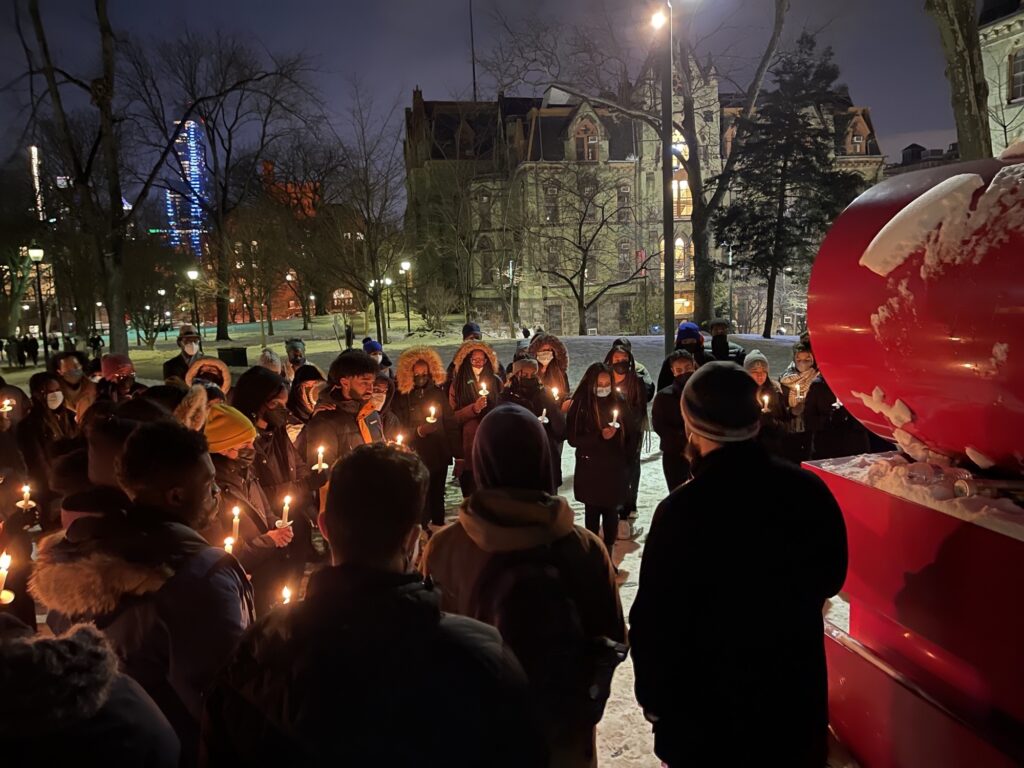
“We don’t throw Band-Aids at the problem,” says Elaine Varas, senior university director of Student Financial Aid, who is frequently in partnership with the SIS office. “We’re creating a plan that helps students succeed at Penn.”
In 2017, SIS received a class gift to establish the University Life access and retention fund. Smith used part of that funding to purchase 40 laptops. The next year, the office began partnering with financial aid, which now provides laptops for all highly aided students. On top of that, SIS provides additional laptops for students through the emergency and opportunity funding program, which serves as a safety-net to make sure students don’t fall through the cracks. “Sometimes students are not defined as highly aided; that doesn’t necessarily mean that they have the means to get everything they need,” Smith says.
Many of the questions Smith asks are the questions she wished someone had asked her in college, she says. “I was a first-generation student and myself an immigrant,” she says. “I came here as a teenager from Jamaica with my dad and siblings, finished high school here the in U.S., and went on to college.” Smith attended Cheltenham High School in Montgomery County, Pennsylvania, where in a student body of 500, she was one of six Black students. When asked what that experience was like, Smith paused. “It prepared me for the world,” she says.
Smith uses her experience to help vulnerable students at Penn, building SIS from the ground up. The program is a way for her to design the kinds of support she would have wanted as a young student, the support she helped to create for her younger siblings. “Our job is to create a safe space,” Smith says.
During the onset of COVID-19, SIS was part of the team that helped to depopulate campus, ensuring that students had a safe way to travel and a safe place to land. “With the pandemic, what stands out to me is the volume and the breadth of the impact,” says Lauren Rudick, director of SIS. “We worked with hundreds of students.”
Penn asked the team to pool their knowledge about students: Who could safely go home and sustainably study and who needed to stay on campus, says Varas. “It gives a holistic picture about a student,” she says. “Every one of us knows a piece, and when you put all the pieces together, it finishes the puzzle.”
“When you ask students to depopulate, what does it mean to a student who is highly aided?” Smith asks. For many, funding for housing and meals are crucial, she says. “Going home, those things might be a challenge. That’s where we come in, to be the advocate and the resource on behalf of the students.”
The fall of 2020 was an online semester, with students Zooming in from across in the globe. During the Africana Studies Summer Institute, professors noted that several pre-freshman students did not have their own laptops and were calling in on borrowed equipment or using their phones. “How do we admit students to a program that’s virtual, and they need equipment, and we don’t have it?” Smith asks.
Some of the students were international, adding an additional layer of complications. “I picked one and asked him to meet me on What’s App,” Smith says. She asked him if he knew someplace in the community that might work with Penn. The next day, Smith heard from him. He was calling from a store in Kigali, Rwanda, and Smith tried to give a credit card to the employee there. They wouldn’t take that form of payment. Smith asked if she could wire the funds and pulled in Varas. Because the store was such a small company, Penn couldn’t wire the money to a bank, Smith says. The only option was Western Union.
“Then I realized, wait a minute,” There were other students in the area,” Smith says. She asked the store owner if she could wire the funds for all the students and he could he get laptops to them. He agreed.
“So that was Friday,” Smith says. “I turned it over to Elaine, and they wired the money. I’m in bed, it’s like 1 a.m., and I hear my What’s App go off. So, I go and I look, and it’s the gentleman in Rwanda.” He had gone to get the Western Union funds and the police stopped him, saying they needed documentation from the institution on letterhead to verify the agreement. Smith got out of bed and got it done.
“It was definitely a piece that we, as an institution, had never embarked on before,” Varas says. “We were treading on brand new territory.”
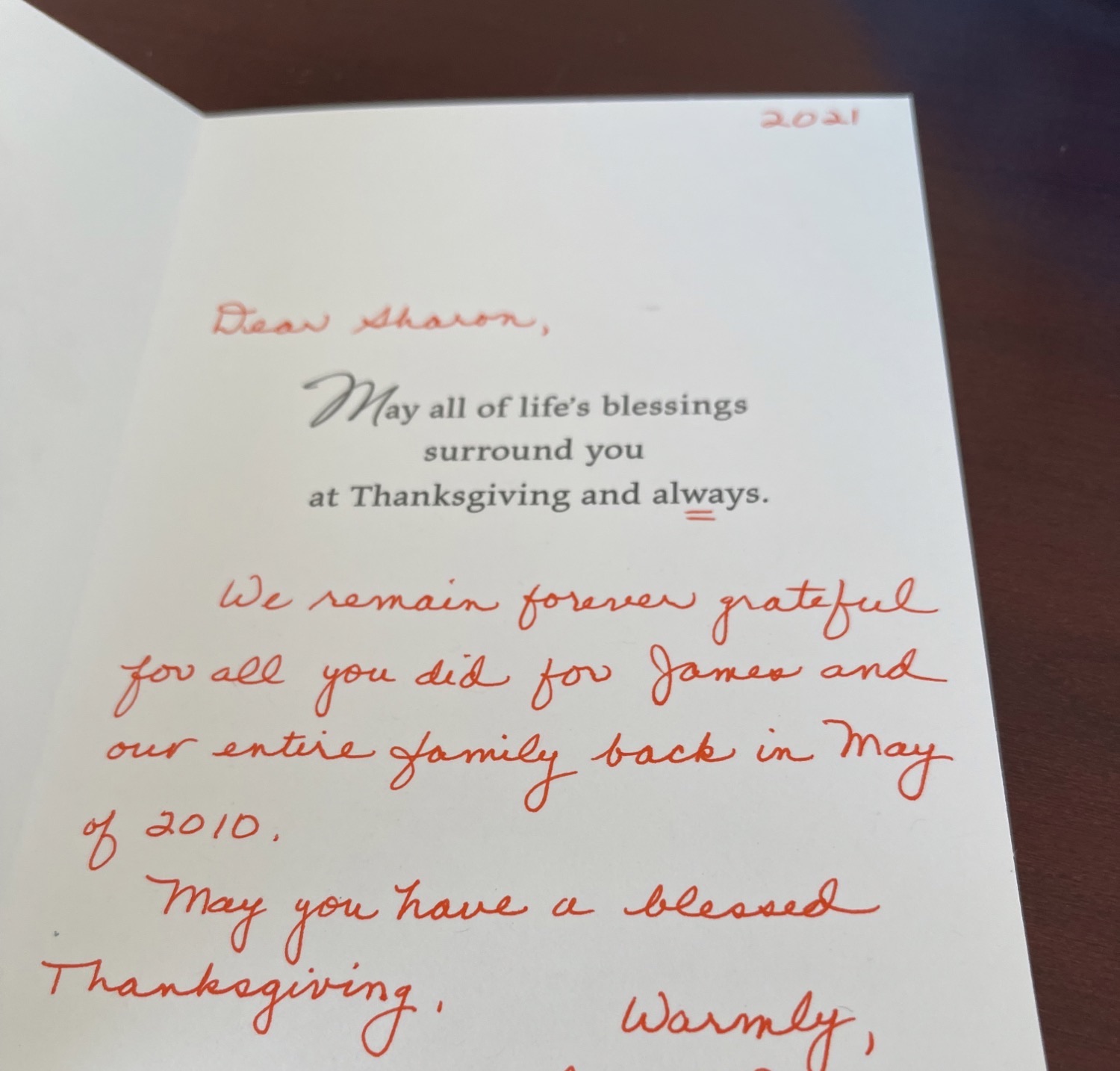
Once they had a protocol in place, SIS and financial aid used this method to procure laptops for other international students, Smith says. “That’s one of my proudest moments.” Coming up with creative responses to support and advocate for students is “what we do in SIS,” says Smith. “We have a playbook like anyone else; we have protocols and so forth. But every single case that I’ve worked on, they have nuances that are just unique to what we do.”
The most challenging aspect of the job is informing the family that a student is injured, missing, or deceased, Smith says. The instances where SIS is able to make a difference—to connect a student to counseling services or house a family whose child is in the hospital after a car collision—are extremely rewarding, Smith says. Some families send the office Christmas cards every year.
“We’re seeing many students at one of the hardest times of their lives,” Rudick says. Watching them graduate is “our proudest day, to know the obstacles that they overcame in order to get there and to see their pride and their happiness in being able to achieve their goals.”
Student Spotlight: Xandro Xu
If you don’t already know, I am Carola Agostini, a freshman here at the University of Pennsylvania. My goal, with the help of University Life, is to show the real college experience at Penn and to showcase the bright students that make this place so special. Recently, I interviewed Aditi Singh, a bright young woman who overcame very difficult circumstances and found herself after getting lost. If you are interested in reading Aditi’s story you can check it out here.
Fast forward a few weeks later, I interviewed yet another bright young student named Xandro Xu. Midterm week was particularly difficult for Penn students, especially those in the Psychology department. As I took brief breaks between studying, I was scrolling through my Instagram feed and saw a poster for events happening in the incoming week. The list was titled QPenn week. Interestingly enough, I was coordinating an interview with Xandro Xu to discuss the planning of this event, but since I was focused on my midterm, I had scheduled it for the following week. It was Wednesday, March 23. I just took my midterm, and I revised the event list for QPenn to see if I could report on a specific event for the interview. Then I saw there was an ice skating event that very night. An idea brewed in my head, “What if I interview Xandro at the ice rink?”
To be completely honest, I thought he would decline my proposal because it was so last minute. Little did I know that two minutes later, he responded to my email by saying yes to the interview.
I was shocked, to say the least, but also very excited. At night, I went to the ice rink and had the pleasure of interviewing Xandro Xu.
Xandro Xu is a Chinese freshman here at Penn. He works with the LGBT Center, and he is a Vice Chair of Education at Lambda Alliance, an umbrella organization of the LGBTQ+ affinity groups for queer students. In that role, he is tasked with the great responsibility of organizing QPenn, a week of events, to celebrate the LGBTQ+ community presence on campus. When speaking to him at this event, I could tell just how passionate he was about representing and fighting for this community. I could also tell just how important this event was for him and his team. They were all very welcoming, and I could tell how much effort they put into making QPenn a success.
Xandro and I come from very different backgrounds, but I found I could relate to a lot of what he was saying. I think a lot of people would benefit from learning from Xandro mainly because he is unapologetic about his background. Despite feeling difficult to express himself and his sexual identity, he was able to not only come to terms with who he is, but be proud of it. That, to me, is not only honorable but brave. We also had a meaningful conversation on the concept of trust. I’m sure we are not the only ones who have experienced this, but trust can be a very tricky thing. Our families encouraged us to not trust anyone for a variety of reasons. Particularly, as a student from an underrepresented community, it can be very daunting to let your guard down in the face of uncertainty or intolerance; however, during our talk, we both agreed it is necessary. As humans, we need to be able to trust, to have friendships and to love, because that’s something we deserve. Everyone deserves the chance to be happy because we are not machines meant to be perfect, unemotional, and merely productive — we are human.
Another thing that I noted whilst talking to Xandro was how he valued spontaneous outings with his friends as the best times he’s had on campus. He very much reminded me of all the memories I made since coming here: the multiple adventures and laughs made on a whim. That is what the Penn experience is and should be. Penn is hard, don’t get us wrong. We are not saying you shouldn’t study, but the Penn experience should be more than that. Your time at Penn should be about growth and connection. Moreover, what makes Penn special is not the academics or the aesthetics, it’s the people. It’s the people, as Xandro says, who go on spontaneous strolls down Locust Walk or make you laugh after a long day. It’s especially those people who support you unconditionally. Thus, like Xandro suggests, there is nothing wrong in giving up one or two hours of studying to have a fun time. Who knows what could happen. Maybe you meet your soulmate. Maybe you’ll have a night that you’ll remember for the rest of your life. What you should learn from Xandro is to be open-minded and open to the possibilities, be unapologetically yourself, and fight for the things you believe in. That is what the Penn experience is all about.
Before I sign off, I want to extend my gratitude to Xandro Xu for this interview and welcoming me to this event with open arms. I can report the event was extremely fun, even for an island girl that can’t skate. I also strongly recommend that everyone look forward to and attend next year’s QPenn as a way to support and uplift the LGBTQ+ community in our campus.
Until next time,
Carola Agostini
The Interview
- Tell us a little about yourself, how did you come to join the center, and what do you enjoy most about being part of the community?
-
- First thing about me is that I’m Chinese. Growing up in a very small town with little diversity, I found that being myself in terms of my sexual identity was a bit hard initially. It was hard because, in most cases, immigrant parents are intolerant to such matters in regards to the LGBTQ + community. Initially, my parents were not very happy with me coming out as gay. However, I’m very lucky that I have such loving parents that really thought it through and said “this is my son and I love him exactly for who he is”. I’m really glad I have such a supportive family. Regarding the LGBTQ+ community at Penn, I knew it was something I wanted to be a part of right away. In high school, I didn’t really have the chance to advocate for this community as much as I wanted to due to the fact that my school was very homogeneous. So I was very happy that I could do that at Penn, and it was something I knew I wanted to do.
- What work do you do with the LGBT center?
-
- I am a program assistant in the LGBTQ+ center, basically, it’s a front desk job where I help people find their way and use our resources. I also work by providing confidential and unconditional support to students that come to us for help. I also help with a collective to promote minorities through works of art.
- What is QPenn? What is the purpose of this event?
-
- QPenn is a week designed to really celebrate, uplift, and amplify the LGBTQ+ community on campus. It is a week to show the presence of the community on campus, to say, “this is who we are and here we are.” QPenn is the week to bring underrepresented minorities to light.
- Why did you choose to organize the event this year? What was your goal for this year’s QPenn?
-
-
When I first came to Penn, I was very interested in joining the Lambda Alliance, which is an umbrella organization of different LGBTQ+ affinity groups on campus. I participated in a pre-orientation called pinnacle and one of the group leaders was an officer for Lambda Alliance, which motivated me even more to join. Thus, I joined Lambda Alliance and during the fall semester, I ran for the board position of vice chair of education. Historically, this position is responsible for organizing QPenn so that is how I fell into the role.
As for the planning of the event itself. It was great. However, there was a lot of uncertainty regarding whether it would be possible due to the COVID-19 restrictions at the time. We didn’t start planning it until February, at which time we were certain the event could be held. Obviously, with such a huge event, we would’ve loved to start planning sooner, but the circumstances did not allow for it. What made this event possible was the teamwork. We delegated tasks to each other, and we were able to work together to pull this off, for which I am immensely grateful. It was really important to us that this event was held because it is the first QPenn in three years. Our goal was to bring QPenn back and to hold it in person, even if it wasn’t as big as it was in previous years. We wanted people to know that this is a week and that it’s an event everyone should look forward to. I also want to mention that as a freshman, I feel like I learned a lot not only about planning but about the older folks in the community. Getting to know them while planning the event helped me understand how things work behind the scenes and I’m really grateful for that opportunity.
-
- How was it planning this event? What were your main takeaways and what do you hope students learned or obtained from QPenn?
- Planning this event was hectic, but also very fun. Again, I think the main reason why this event worked was for the team behind it. It was really heartwarming to meet so many people willing to collaborate to make this event a reality and also to see such initiative from them. Something that I learned from this experience is that planning should’ve been done a little earlier, but due to the circumstances it was obviously not the ideal situation.
- Which was your favorite event from QPenn?
-
- I really liked the opening event; we had people perform and speak, it was a great vibe to kick off the week. We had a great turnout. Apart from that, I also liked today’s event because it seems like a grand gesture. We decorated the whole ring and we even have an inflatable in the back. I love ice skating, so I think this is a fun gesture for the community and it’s one of the events I’ve liked most so far.
- What is your fondest memory from your time with the LGBT Center?
-
- I’m not very good at remembering things, but I would have to say my fondest memory is the staff meetings. This is where the staff, the director and the assistant director come together to talk. I like the sense of community and talking to people, so that is what I cherish the most.
- What is the best piece of advice or the most valuable lesson you have learned while working with the LGBT Center?
-
- I would say be really open-minded, empathetic and understanding. This is because you never know what someone is going through and as workers in the center, our job is to help people. If we were to assume things, we would have a very skewed view of situations. So definitely a valuable lesson is to approach things with an open mind.
- What advice would you give future planners to make QPenn even better? Any ideas?
-
- Something that I did that really helped with the planning was the delegation of certain roles. Initially, I was stressed about QPenn because I thought I would have to plan this whole event by myself. But again, building a community and a group of peers that are there to support you is really important. This not only allows for a creative flow of ideas but also builds that sense of community that QPenn really is all about. Just really seek out help because it’s an event that can’t be done by one person. Another tip I would give to future planners is to seek out the community, allow for other cultural resource centers to help and spread the word. Finally, I would just suggest you give yourself ample time to plan QPenn.
Student Spotlight: Aditi Singh
Aditi’s story
I am Carola Agostini, a freshman, Class of 2025, studying in the College of Arts and Sciences. Like many of you who read this, I am also getting to know what life is like at Penn. Before coming to Penn, I’m sure like many others, I watched all of the videos I could find describing the day-to-day activities of students. Now, halfway through my second semester, with the help and support of University Life, I have a chance to tell students’ stories and hopefully show what life is truly like at Penn beyond just a day.
Aditi Singh was my first Student Spotlight. Aditi started working as a tutor during her freshman year. She focused on math and science because she describes herself as a “STEM nerd.” As a fellow tutor, I was very excited to meet someone who I had heard was a successful, resilient, young woman. Personally, I was a bit nervous leading up to my first interview, but, as soon as I met Aditi, she made me feel at ease. Aditi is just one of those people who you never run out of things to say in a conversation. We spoke peer to peer, and she was kind enough to sit down with me and tell me her story.
Aditi had a best friend. They were stuck at the hip, inseparable; however, when they roomed together during her sophomore year, her friend began dealing with mental health issues. Unfortunately, due to extenuating circumstances, Aditi’s friend took a leave from Penn. In the aftermath, Aditi tackled personal changes. She learned how to cope and function without her closest companion. “I think people underestimate how sad things can make you,” she said. “I was devastated.”
Staring out of her residence hall windows, Aditi wondered how she would be able to move forward. She would wake up and crawl back into bed with the hopes of sleeping the days away. Despite her sadness and feelings of uncertainty, she promised her parents and herself that she would continue attending classes and maintaining her grades. Over time, Aditi found comfort in the routine that her tutoring position gave her. Tutoring became the highlight of her day — a constant in her life. Tutoring was something she was good at.
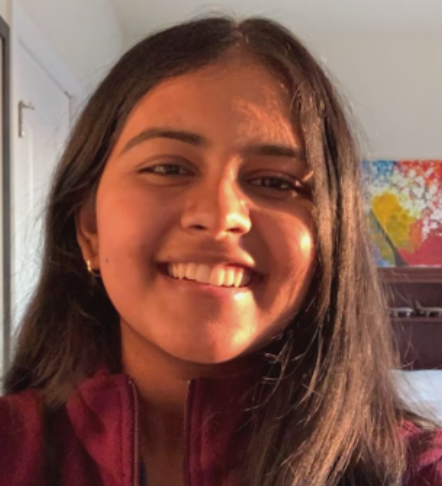
Amidst all the uncertainty, tutoring gave her stability and became a light at the end of a dark tunnel. One day, Valerie Wrenn, the associate tutoring director at Weingarten, asked if she wanted to be the lead math tutor. “That news was way bigger for me than it would’ve been without the hardships,” Aditi said. “It was something, something to hold on to. You wake up one day and the sun is brighter.”
Aditi continued with her process of healing and growing. Now, as I interview her, I see a bright young woman who lights up the room. She is kind, she is smart, she is strong. Most of all, she is inspiring.
Talking with Aditi was the highlight of my day. Like many students often experience, I had a very tough week. Our conversation was comforting: openly talking about the struggles we both went through was therapeutic. Like Aditi said, Penn is hard — there is no sugarcoating it. There will be days, weeks, and even semesters where you are not at your best. Those ‘Day in the Life’ videos that we constantly binge only show snippets of the good parts.
As a community, we are working hard towards breaking what we call ‘The Penn Face.’ We want students to know that it is okay to not be okay. It is okay to seek help, and we encourage you to seek help. Even though Penn can seem daunting, there are great people and resources here to help. There are students like Aditi that light up every room and staff members like Valerie that support their students. If there is anything to take away from Aditi’s story, it is to seek help, surround yourself with people who support you, and do things that make you happy.
Until next time,
Carola Agostini
My Conversation with Aditi
- Why did you want to tutor?
I love tutoring because the look on someone’s face when they understand something is priceless. I don’t know how to describe it, but I cherish the ability to empower other people. It makes me feel so happy for me and for them.
- What did you learn about yourself through the process of tutoring others?
Definitely that you need to be patient. You also have to be creative because it matters how you explain things to people. Since people learn in different ways, you have to think on your feet and adapt to what the person needs. The ability to think on my feet has helped me in so many ways and in so many areas of my life. Additionally, having that level of compassion for other people helps you have compassion for yourself, it increases your self-esteem in the process.
- What is your preferred method of learning?
I am a very auditory learner; I repeat and explain things to myself. I also write things down in order to learn it better. My tutees are mostly visual learners so I make sure to always make flowcharts for them. I also think it is super important to learn how you learn because it makes everything much more efficient.
- How did tutoring help you find your way?
As I mentioned before, the structure really helped me because it gave me a routine so I didn’t have to worry about what comes next. I didn’t touch on this, but Valerie, the associate director, was super supportive. Having someone that supports you make a world of a difference. I really love to mention her because she’s great.
- What strategies do you use when tutoring students?
The more you do something and the more time you spend on it the better you will be. Additionally, I always like to start with the fundamentals, because if you have a strong foundation, you will only get stronger and better the higher you go. I like for my students to explain what they’re learning in class because it helps them actively engage with the content and we can scaffold on information together. After that, we continue with practice problems where they will fill in parts of the problem and then do it on their own. There’s a little bit of hand-holding at first, but then they go off and do it for themselves.
- What is your favorite tiny victory in tutoring?
I was tutoring this group of three people — two girls and one guy — during Covid-19. The guy was very quiet and no matter how hard I tried, I could not get him to speak. Suddenly mid semester, after numerous tries, the guy starts talking and the whole group is cracking jokes. It was just the most wonderful community building I’ve ever experienced. I loved it.
- What advice would you give new students at Penn given your own experience?
It is very important to build a support system here at Penn. I feel like you could feel really lost. My freshman year, I have to mention I wasn’t eating or sleeping right, all these little things that you take for granted. Because of this, I think it is really important to establish a routine. Also, seek help, find help in all the right places. There are so many places that support you, I just didn’t know them as a freshman, I didn’t know where to look. Just start somewhere and actively seek out the help you need. Penn is hard. There is no way of sugarcoating it, so just actively seek out help and don’t concern yourself with people liking you; find and surround yourself with people you like. Acceptance will come and start with yourself.
A charter bus to Chinatown
hiladelphia was an adjustment for Jingzhi “Jacey” Chang, who arrived just before the pandemic. “You would feel homesick, definitely, and sometimes I think I would feel lonely,” says Chang who graduated from the Stewart Weitzman School of Design’s master of city and regional planning program last year.
During the early part of the pandemic, Chang, from Harbin, China, says she didn’t go outside for months. So when asked to think about transportation modeling in a course taught by Megan Ryerson, she thought about her own transit needs as an international student. Many of the sauces and vegetables she needed to cook for herself are not available locally in West Philadelphia. She says the first time she bought an American eggplant it was not what she expected. Yet she felt uncertain about taking public transit to Philadelphia’s Chinatown, feeling both fearful of anti-Asian racism and because not all transit riders were wearing masks. “So, I think I won’t be the only one,” she says. “I think some of the Chinese students are not familiar with asking for help. I think they are in need of help.” In three surveys with more than 300 responses, Chang saw there was a need for safe, reliable transportation to Chinatown.
The Chinatown charter bus service, launched as a pilot program in spring 2020, ferries anyone with a Penn card to and from Chinatown on alternate Saturdays, with buses running every 30 minutes between noon and 5 p.m.. On average, about 200 seats are reserved when the bus runs, says Peter Van Do, director of the Pan-Asian American Community House (PAACH), whom Chang consulted for help in her project. The service, co-sponsored by PAACH, the Undergraduate Assembly, the Graduate and Professional Student Assembly, and the Chinese Students & Scholars Association at Penn, in collaboration with Penn Transit, is staffed by volunteers. The service, which went on hiatus during the winter, is up and running again, with its next service on March 19.
When Chang graduated, she asked fellow design graduate student Jing Zhang of Beijing to take care of the project. Zhang coordinates the volunteers and volunteers herself. She says she’d like to see the program expand, with more stops to service the broader international community, but the project needs additional funding to survive past the pilot stage.
“I really like this service,” says Zhang. “I feel like it provides not only emotional support but also physical support to the Asian community.”
Wen Jiang, a second-year Ph.D. student in computer and information science in the School of Engineering and Applied Science from Shaanxi, China, takes the bus every two weeks to buy sauces and vegetables, he says. He learned how to cook from Chinese websites and YouTube and likes to make dapanji, “big plate chicken” with potatoes and peppers, and Laziji, a dish of spicy chicken from Sichuan cuisine.
Deborah Xie, a first-year graduate student from Nanyang, China, who is in the master of science in social policy program at the School of Social Policy & Practice, says she feels safer taking the charter bus. “It’s clean and on time,” she says, and builds a sense of community.
Change of Plan
During the pandemic, Oliver Kaplan transferred to Penn looking for a fresh start. A philosophy class altered his academic focus; he now hopes to shape educational policy for LGBTQ+ students.
Oliver Kaplan knew he had to make a change when, two months after his freshman year on a rural college campus, he was outed. Kaplan, who describes himself as “very closeted” until that point, had recently attended a discussion on LGBT rights, and his roommate started telling, first friends, then Kaplan’s parents, that Kaplan was gay.
“At that point, I thought, Well, do I try to correct people? Because I don’t know if I’m ready to be out, but if I correct people, then people are just going to assume I’m straight, and I’ll have to be closeted for the rest of my time here,” he says.
First, he met with the office of residential life, trying to get his roommate transferred to a different room. But since outing wasn’t a violation of any written rule, they “kind of threw their hands up and said, ‘Well, it’s not in our handbook.’”
Outing is a unique situation, Kaplan says. “If you’re not gay, you don’t understand how important that information is.” People try to equate outing to racial identity, and it’s not the same, says Kaplan, whose mother is Chinese and father is Jewish. “If someone were to say, ‘What if I tell other people that you’re Asian? What does that matter?’ Well, first of all, race and sexuality are not the same; you can tell my race from my face, but you can’t discern my sexuality,” he says.
Coming out, first to friends, then family, was a seven-month process that took place during the pandemic. At that point, Kaplan had become determined to transfer schools and had an interest in Penn. Kaplan contacted Erin Cross, director of the LGBT Center, who connected him with a Penn student who later became a mentor.
“Being outed is having other people share something about you that is so private and personal that, when it happens, it goes straight to your core,” says Cross. “It’s a complete lack of respect for someone’s humanity and agency. Someone’s sexual orientation is only for them to share if they want to,” she says.
Penn is consistently ranked as one of the top schools for LGBTQ+ support, says Cross. The LGBT Center is the second oldest of its kind in the country, she says, “so we’ve had a history to build up community, sub-communities, academic ties, and links across the University.” As a response to homophobic campus incidents, Penn included sexual orientation in the University’s non-discrimination clause during the early 1980s. “We were at the forefront,” Cross says. “Penn and the city of Philadelphia have worked hard to make sure LGBTQ+ folks feel as safe as they possibly can, but there’s always more to do.”
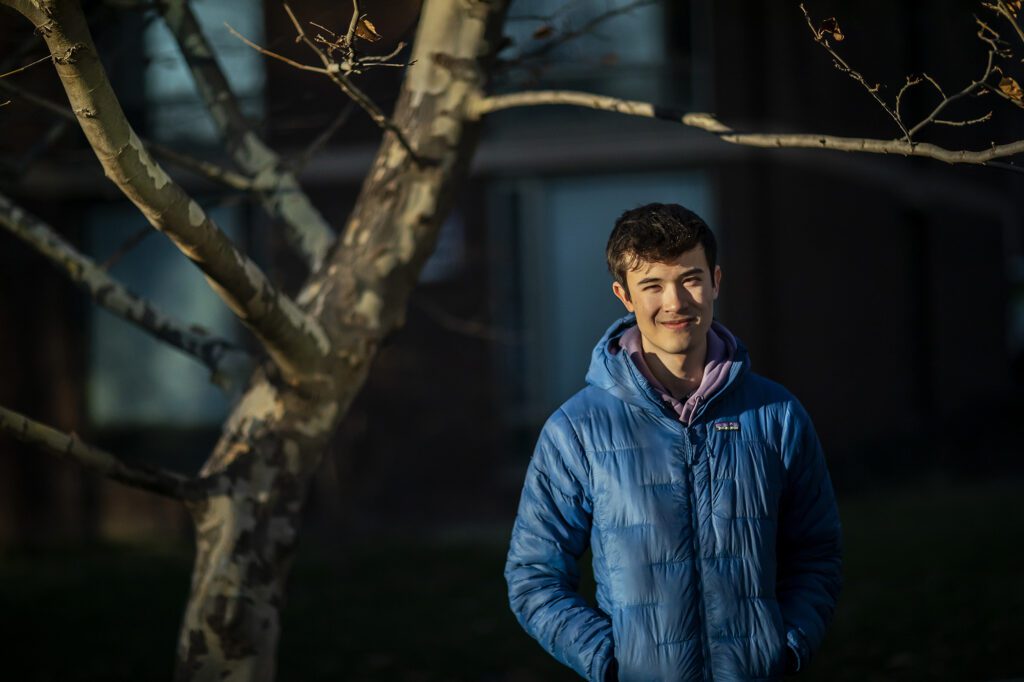
Winter solace
Ángel Gutiérrez has three homes: Texas, Mexico, and Philadelphia, they say. “To me, home is a place where I feel both belonging and care.” For the latest installment of People and Places at Penn, Penn Today spoke with Gutiérrez and three other students about where they feel at home, what motivates them, where they seek solace, and how they unwind during the colder months on campus.
Ángel Gutiérrez is from Pittsburg, the one in rural east Texas. Gutiérrez’s parents immigrated from Michoacán, Mexico, and the sophomore is exploring their relationship to the environment, an interest furthered by their studies in anthropology and philosophy. “What are my obligations to the lands? Who am I in kin with, and how can I be in better relations with the many beings around me?” they ask.
At Penn, La Casa Latina has become a home away from home. “I mean, everyone says that, but it’s true,” Gutiérrez says. It’s a place where they can unwind and talk with director Krista Cortez, who “provides sincerity and a fresh breath of air,” Gutiérrez says.
As an anthropology major, Gutiérrez is often found in the Penn Museum Library, which they discovered last semester. “I appreciate a quiet space on campus to decompress before or after class,” they say.
This summer, Gutiérrez plans to conduct a research and film project in their parents’ home village. Michoacán leads Mexico’s avocado export industry, creating a sharp contrast between industrial companies, rural farming traditions, and Indigenous land practices, Gutiérrez says. They are hoping to archive stories, songs and traditions “to create an archive of brown joy” of their family’s history and resistance to colonial violence.
From the Class of 1923 Arena, where figure skater Gloria Lee likes to practice, to Makuu: the Black Cultural Center, where math TA Abdul-Rakeem Yakubu holds office hours, to the behavioral sciences section of Van Pelt-Dietrich Library Center, where Emma Ronzetti escapes to, these students picks offer a sense of calm, or in some cases, inspiration.
Gloria Lee
Originally from Highlands Ranch, Colorado, Gloria Lee discovered the Biddle Law Library early on, while walking around with friends. “We were freshman and wanted to explore the campus,” she explains. “I found all these booths downstairs and it looked like a good place to do work.” Plus, she adds, not many people seem to know about it, so there is “always a booth open,” she says. “I could spread out as much as I needed.”
Lee is now a junior in Penn’s Vagelos Integrated Program in Energy Research, which combines her interest in research along with a focus on sustainability and environmental activism. When not studying, Lee can be found at the Class of 1923 Arena, where she is a member of the Figure Skating Club. Lee has been figure skating since age 8, and says the tight-knit community has sustained her interest. “It’s really fun to practice with your friends,” she says. “I taught a couple of friends how to skate and we do lessons as part of the club.
“What I like about figure skating is that it’s a very athletic thing, but it also requires a lot of showmanship, making sure you have the right balance and are able to do your jumps,” Lee says.
Abdul-Rakeem Yakubu
One of Abdul-Rakeem Yakubu’s favorite spots is the David Rittenhouse Laboratory, home to the mathematics and physics and astronomy departments. “It’s a cool innovative building to walk through,” Yakubu says. “There’s a math library not a lot of people know about and a math lounge” with coffee and tea. The original red brick structure has “old elementary school vibes” that remind Yakubu of the movie “Good Will Hunting.” “It motivates me a lot, seeing the math work on the wall,” he says.
Currently a junior, Yakubu has been a math TA since his sophomore year, hosting office hours at Makuu: The Black Cultural Center, his “No. 1 favorite spot.” He likes helping out the professors and students, and Makuu has become a place to relax and see familiar faces, Yakubu says.
Growing up in Mooresville, North Carolina, Yakubu originally wanted to be a race car driver. Now majoring in math and biology, he’s on a pre-dental track. Dentistry is “a huge field with lots of impact,” Yakubu says. On the big scale, dentistry is involved in initiatives like the COVID-19 saliva test, he says. “On a small scale, just making people smile.”
Emma Ronzetti
Emma Ronzetti has always been fascinated by what makes people tick. Ronzetti, who has worn hearing aids since middle school, wants to study the behavioral economics of people with disabilities. Currently a student in the Master of Behavioral and Decision Science Program, Ronzetti graduated in December 2021 with a bachelor’s degree in economics and minors in statistics and American Sign Language (ASL).
A person with a disability often follows one of two tracks, she says—either hiding or embracing the disability, making it part of their cultural identity. Those who embrace their identity are often faced with the uncomfortable issue of workplace disclosure or societal bias, which Ronzetti says will take decades to counteract. “How do we positively change how society perceives disability?” she asks. That’s the question she wants to address with her behavioral science research.
For motivation, she turns to the fourth floor of Van Pelt-Dietrich Library Center, specifically section HB74.b8, the behavioral sciences section. “It really helps me with inspiration and getting on track with what really motivates me and gets me up in the morning,” Ronzetti says. It was in this section that Ronzetti realized she wanted to study behavioral economics. “It’s a very personally significant place for me,” she says.
As Ronzetti closes out her last semester at Penn, she’s reflecting on “what really impacted me here, especially in the winter months,” she says. One of those spots is a bench right outside the Fisher Fine Arts Library, which she found in her sophomore year. Ronzetti and her best friend would meet up on the bench for coffee after enduring an early morning math class, where “we were both kind of dying,” Ronzetti says.
After graduating this spring, Ronzetti hopes to gain experience in research before hopefully moving the needle on centuries of bias towards differently abled people. Deaf people are far more visually oriented than the average person, she says. Why not focus on the advantages rather than thinking, “what can they not do?” she asks.

